ColdLight
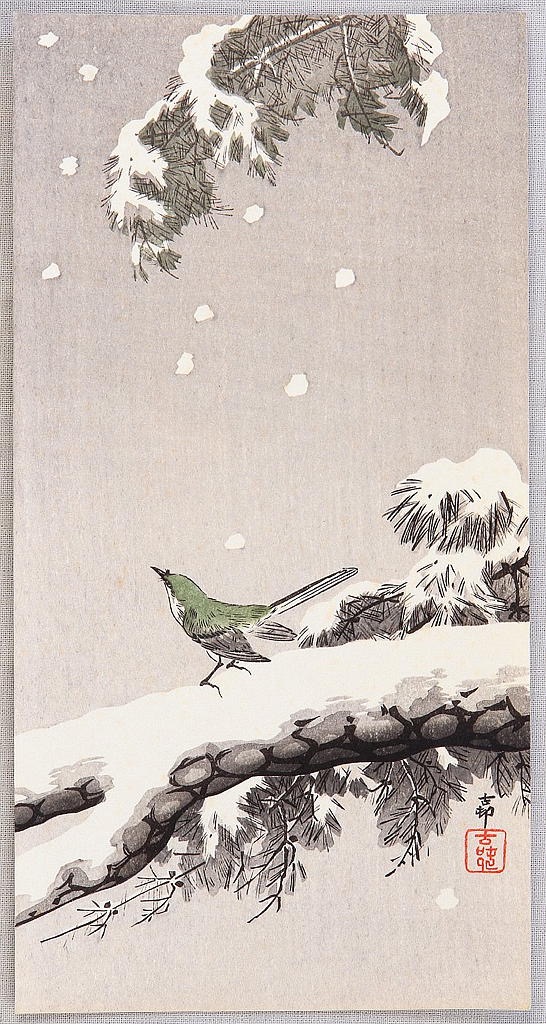
Ohara Koson: Bush Warbler in Winter (Ca. 1900-1910s)
"The brightest light on the darkest night of the year …"
Six months ago, light came wrapped in heat. We prayed for sunset, when the hostilities might hesitate overnight, but only to reassert themselves shortly after the following first light. We cowered from light then, when only darkness brought respite and light just seemed punishing. Between sunscreen and sunglasses, we'd suit up whenever we headed outside, long sleeves, long pants, and broad-brimmed hats. We'd rush between places, limiting the time we'd spend outside of our air conditioned spaces, constantly consuming cold beverages. The summer solstice brought more light than we wanted and more heat than we could handle.
Six months later, the light comes with cold in the form of snow which seems to emanate bright.
ExtraordinaryTimes

Ohara Koson: Goose and Reeds (Ca. 1910)
"I'll have to wait and see …"
Our Grand Refurbish fully qualified as an ExtraordinaryTime. I extended myself special dispensation for its duration because I really felt as though I was engaging in something truly special, unique, and valuable. The effort at times felt overwhelming, but I mostly stood up to the challenges. Now I face a more daunting prospect, the utterly ordinary one of returning back into ordinary time. ExtraordinaryTimes offer easy excuses. Nobody really expects you to maintain regular hours if you're busy changing the universe. No one harshly judges anyone nobly engaged. End such an effort, though, and mundane duties and obligations rush in to fill the resulting void. There will be no citations for keeping up with the dusting and dishes. There will be few appreciations awarded for achieving nothing in particular.
For a time, I might reasonably expect to rest upon my laurels.
StartingAtOne

Seated Male Deity Supporting a Vajra on His Finger (last quarter of 10th–first half of 11th century)
Indonesia (Java, Ngandjuk)
" … a meditation on sanity, vanity, and satisfaction …"
Prolific author and psychotherapist Sheldon Kopp told the story of how he learned to meditate. He checked into a Zen center where a master directed him to sit quietly in a corner and count to ten. Though this seemed an inauspicious beginning, he did as instructed. He quickly found that though counting to ten had never before posed a serious challenge, he found himself losing his place when sitting there by himself trying to count to ten, so he returned to the master and reported his difficulty. The master instructed that if he were to lose his place again, he was to just go back to one and begin anew. Kopp reported that it was the longest time before he realized that meditating was not about getting to ten but going back to one.
I imagine that I'm feeling a similar sensation as I set about attempting to live post-Grand Refurbish.
PackingUp
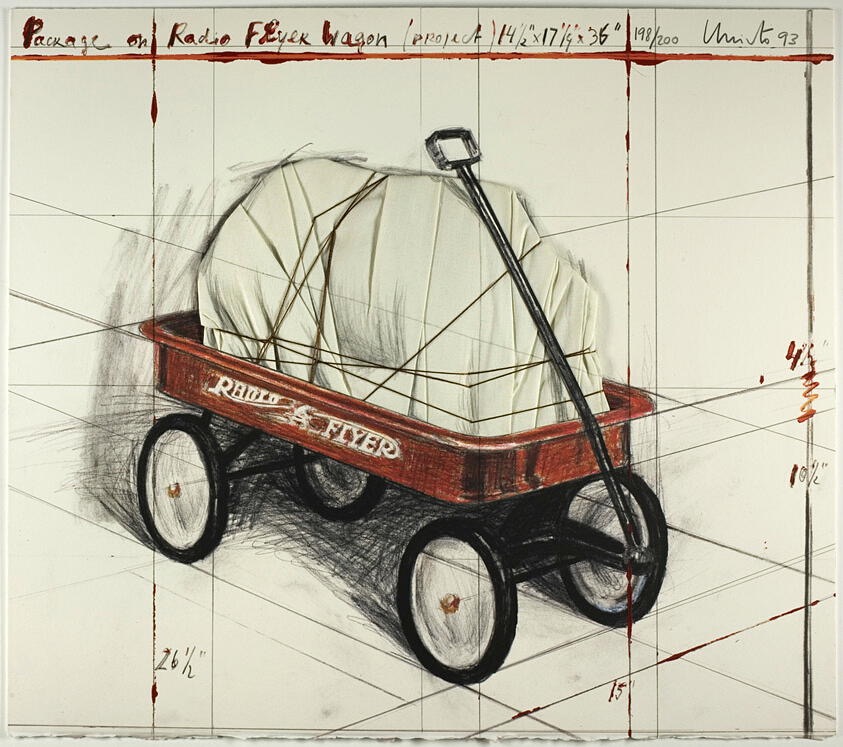
Christo: Package on Radio Flyer Wagon, Project (1993)
" … before telling me what he intended to do for me that day."
"Are we done?" Our Carpenter Joel asked the question, which seemed to come out of nowhere. Done? So quickly? It had been four full months since he'd first showed up, ostensibly to just lay some vinyl planking and complete a few other chores. Those few other chores had grown to include quite a few more than a few other chores, including installing five large windows, refinishing a large staircase, and rebuilding a wall of shelves from scratch. His chop saw had become a seemingly permanent fixture in the middle of our living room since the weather had turned and his periodic saw dust injections had become a part of our accepted atmosphere. He'd just come out from under his rebuilt wall of bookshelves, having anchored their stanchions with fresh long screws, and he was out of work and ready to load up. He was moving out, PackingUp his van and heading home. I could not respond to his question. Though I had been anticipating an impending ending, I had not prepared myself to recognize it when it finally appeared. I found one tiny final task before releasing him from further obligation.
Kurt Our Painter would remain for another day, touching up and cutting in, finishing the final painting, always a lagging indicator of progress
Crowning

Bartolomeo Cavarozzi: Virgin And Child With Angels (circa 1620)
" … wrong crown, its Crowning achievement."
When the future asks after the Crowning achievement of Our Grand Refurbish, I'll retell this story, for it stands as at least emblematic of the entire venture. The Muse had insisted from our earliest conversations that we would finish the three main downstairs rooms with period-appropriate crown moulding. I was fine with leaving the crowns as they were but she was adamant. I know when to avoid doing battle, so I quickly conceded. Period-appropriate crown moulding it would be, then. We torn down the existing stuff and I donated it to the recycled house parts operation out at the old airbase. The replacement proved inconvenient to deal with since it came in sixteen foot lengths, so long that our carpenter had to fetch his other truck with the long overhead rack to transport it. We painted it before cutting and mounting it, but it was too long to store anywhere, so we had to work quickly. Kurt Our Painter spray painted the first batch, but that proved to be a big hassle. Two hours of prep and clean up for about three minutes of painting. It used a lot of paint, too, so we rolled then brushed the rest of the stuff, ending up inside after the weather turned, boards stretching between the two living rooms and creating a serious navigational hazard.
The lumber yard didn't quite know how to handle crown.
Tractoring
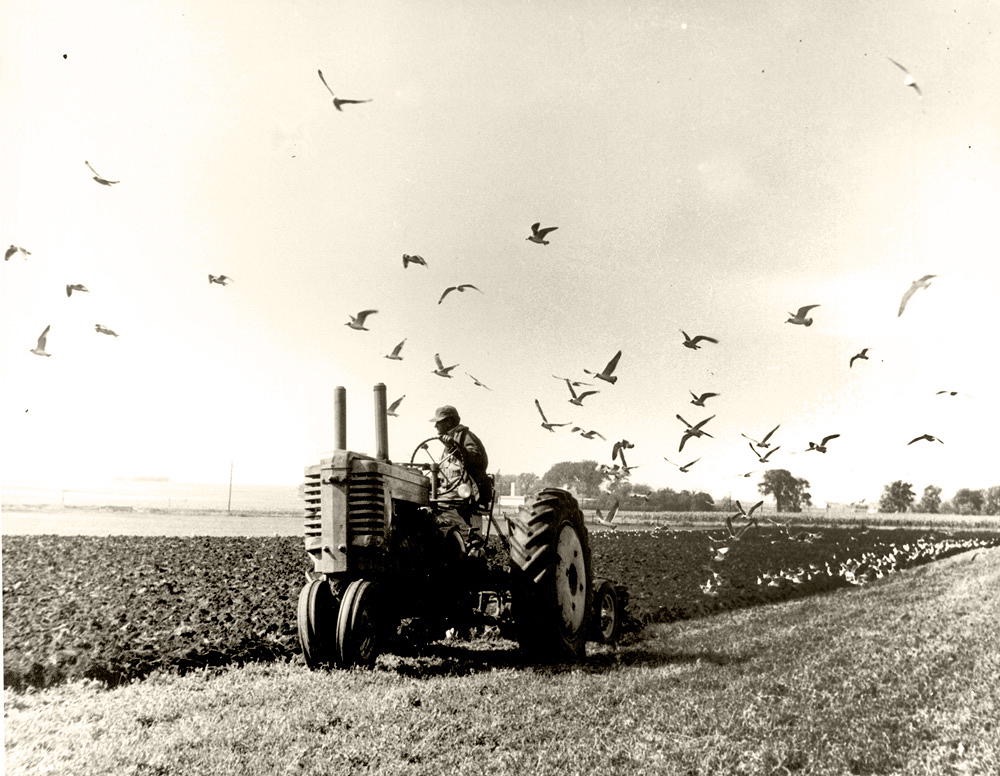
Gulls Following a Farmer on his Tractor, State Historical Society of Iowa (Date Unknown)
" … what else have we got to amuse ourselves with?"
The final few furlongs of Our Grand Refurbish seem to condense all the effort into a few remaining tasks, with each taking on the weight and importance of the sum of all the prior pieces. The final coat of paint goes on in Jovian gravity, heavy and dense. The last screw set seems to pierce stone rather than wood, the driver groans under the strain. Minutes no longer slip by, but crawl. The day seems too small to contain our aspirations for it and for ourselves. Kurt Our Painter puts his head down for a day of dedicated Tractoring, him seeming to possess a hydrostatic transmission with an amazingly low gear, capable of shoving his way through anything. His usual slow-motion Kabuki dance becomes, if anything, even more intense. He appears relentless, but effortlessly so. If the past few days have been short and slow, these next couple will might well turn endless.
A force propels us now, more pulling than pushing.
Muddling

Vincent van Gogh: Sunflowers (1887)
" … which, of course, we ain't."
Let's consider looking at the Covid-19 pandemic as if it were one of those psychological instruments intended to provide feedback about who we really are. I know, those instruments might be the most widely misused and misinterpreted forms of self-discovery, but even this fact might better qualify them for this purpose, for this use. We don't usually read the instructions, anyway, but figure we might just as well muddle through. Muddling might be our primary means of engaging. Even when we have access to concise and accurate information, we tend to ignore that in favor of gut feel or intuition. We can consequently be fairly certain that those with their fingers on nuclear triggers have also not really read the instructions, justifying that decision with a belief that they'd never need to pull it. I mean, how hard could it be to destroy all humanity? Nobody's gonna be left to write that history.
We seem fatalistic, as if learning better might actually kill us or be more dangerous than remaining uninformed or becoming ill.
Plumb
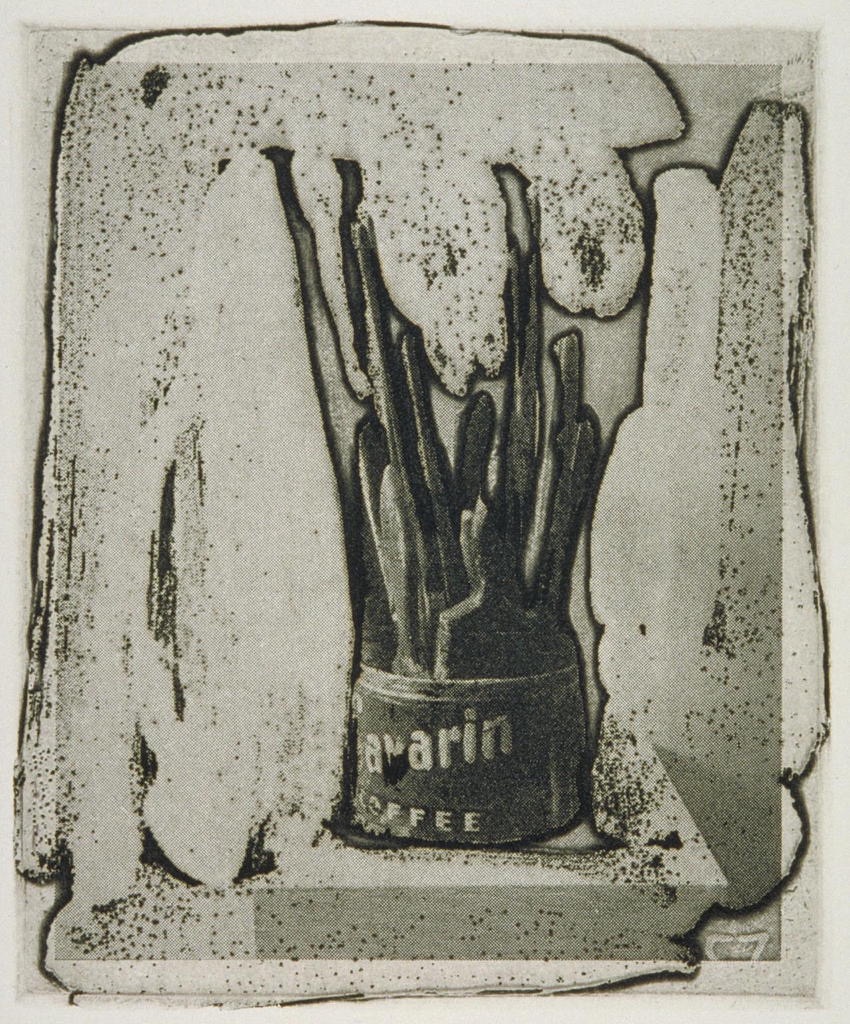
Jasper Johns: [title not known] (1967–9)
"Long live our illusions …"
In this house, Plumb amounts to a fictional concept intended to be interpreted rather loosely. It never refers to anything like absolute verticality, which does not exist here, but to orthogonality relative to level or flat, which also does not exist in this fine home. Every surface might play off the general concept of level and Plumb, but never actual exhibit either. Our new library shelves, the last installation in Our Grand Refurbish, are taking longer to install than expected, though we might have reasonably expected complications. The left adjacent wall, upon close scrutiny, turns out to be roughly dish shaped and canted a degree or two off Plumb. It abuts into the freshly refinished window seat, which slopes ever so slightly back to front, perhaps designed that way to keep marbles from accumulating along its top. The right adjacent wall slopes slightly away from the vertical, necessitating much ciphering and trimming in order to yield more or less level shelf surfaces and also to properly fool the observing eye, which might otherwise discern just how out of Plumb the whole construction turned out to be. Properly constructed and painted, the eye will be fooled and satisfied, for it will conclude that this little corner of the world actually appears to be Plumb, a rarity and a fiction.
We seem to prefer our fictions and even conspire to preserve them against opposing evidence.
TinySignificances

Suleiman at Wasserburg on the River Inn, in a woodcut by Michael Minck dated 24 January 1552.
"We might need gruel work."
Through The Grand Refurbish, a few tiny annoyances remained out of scope but never out of mind. We'd focused our attention on specific portions of the place and chose—at first deliberately, then out of habit—to just let anything else slip by for that time, for we could have nattered away the opportunity by attempting to attend to everything at once. It just seemed prudent to narrow our scope of interest. There would always be a tomorrow. But nearing the end of The Grand Refurbish, few improvements need my personal attention. Our carpenter and our painter cannot quite muster full shifts between them now, we're down to one room, and almost down to a final wall. Those tiny annoyances began calling again or, more properly stated, those TinySignificances continued wielding their power. I finally gave in.
The bathroom door had come to scrape on the floor beneath it.
ThePaintPotPrinciple
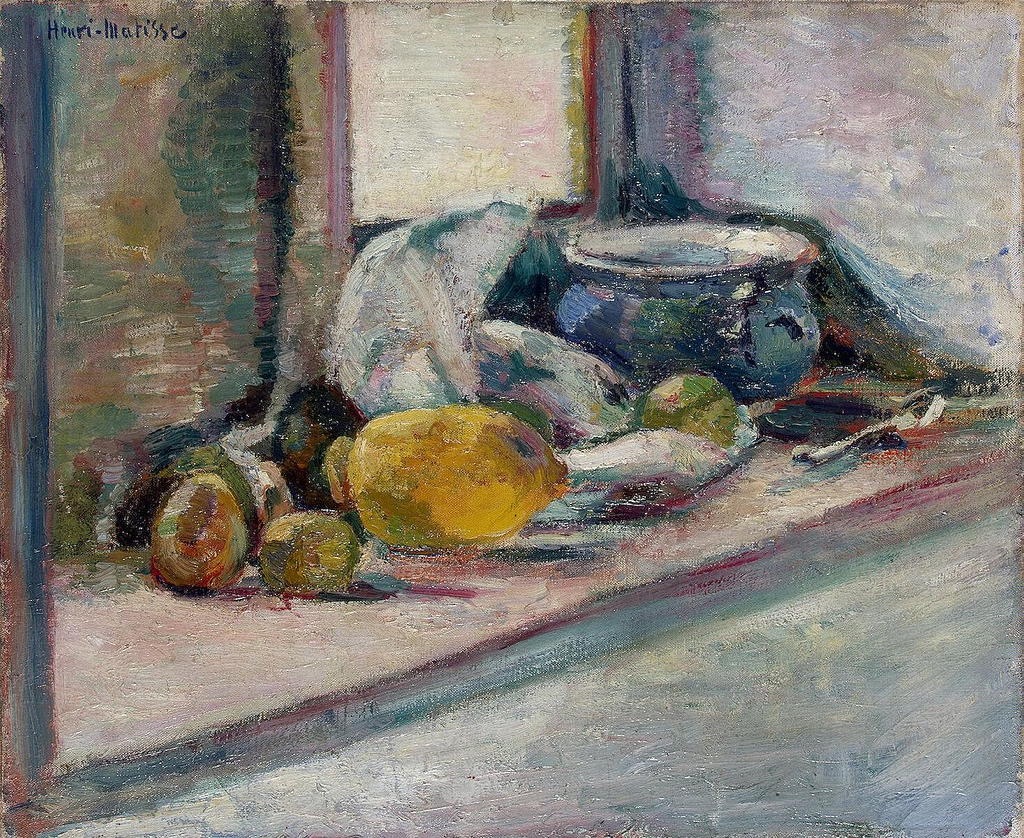
Henri Matisse: Blue Pot and Lemon (1897)
" … precisely what it always was and then some."
The Muse and I hired a professional painter for Our Grand Refurbish, both an expensive proposition and a priceless one. We'd never been ones to hire done our painting, figuring that we might just as well do that work ourselves and retain the wages we would have laid out. We never would have known what we would have foregone had we chosen to go that route, for one cannot notice what one does not experience. Following Kurt around has provided an education for me, exposure to much I never knew or understood about the fine art of house painting. It turns out to be every bit as exacting as anything Matisse ever produced, requiring deep skills in color, technique, and much more. For someone like me, a surface is a surface is a surface, but to Kurt, each one's a little different, demanding a unique approach. We've used a half dozen different primers alone on this job, each formulated for slightly different conditions, ones only an experienced eye might ever discern. After five months of learning, I'm catching on to much I still need to learn. I can't now imagine ever painting anything again without first at least seeking Kurt's wise advice and counsel, if not his paint brush. Oh, and I'm officially no slouch with a brush and a roller, myself.
I've been noticing how our master performs, though, like any first grader might notice in his first teacher.
TheSecondOrderSolution
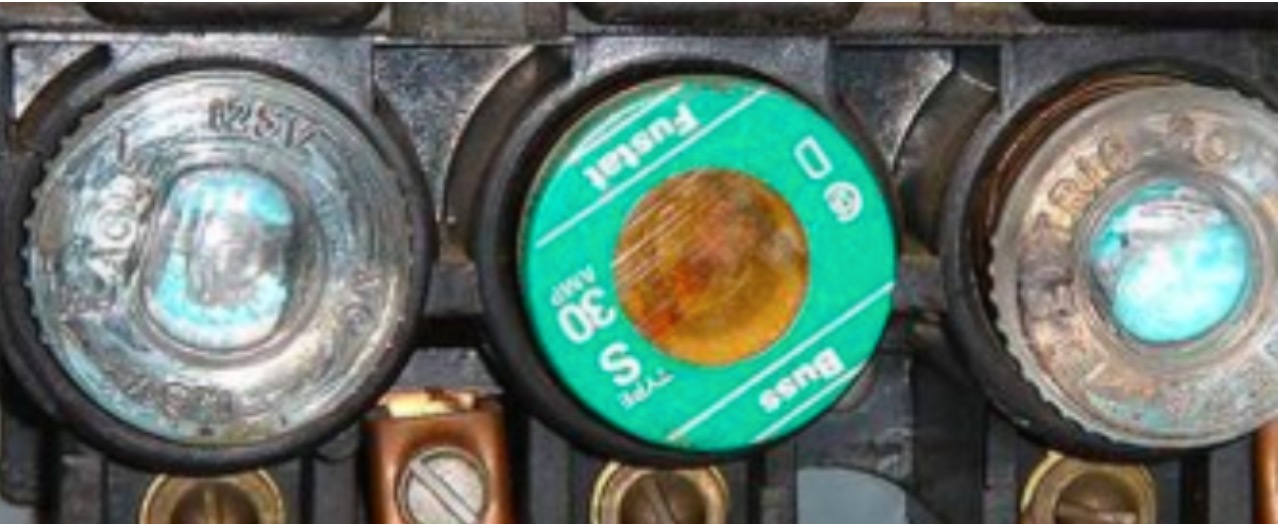
"I pray that I will find a ready penny when my comeuppance comes …"
Our home, The Villa Vatta Schmaltz, might be best described as the sum of its kludges. The midnight fixes that were never formalized the following morning. The interventions completed by unqualified technicians. The misunderstood instructions. The leftover parts. I might be slightly less than fully-qualified to even own a home, let alone expect myself to maintain it, but I have not always found myself in a position where I might contract with a qualified technician, so I'm forced to perform some fixes myself. I wander around the Ranch Supply or The Home Despot, every bit the homeless waif, for my home stands in that moment broken and I've been called to fix it. I might hold a notion about the source of the problem but I don't know the nomenclature, so I attempt an explanation to a hostilely disinterested clerk. I might as well be speaking Ukrainian for all the good my describing does. I'm very likely to be led to a dreaded part of the store, a part filled with tools and materials I've truly never seen or even imagined before, and abandoned there, much worse off than I was before, when I just didn't have a clue.
I call my preferred method of fixing everything TheSecondOrderSolution.
Phinishing
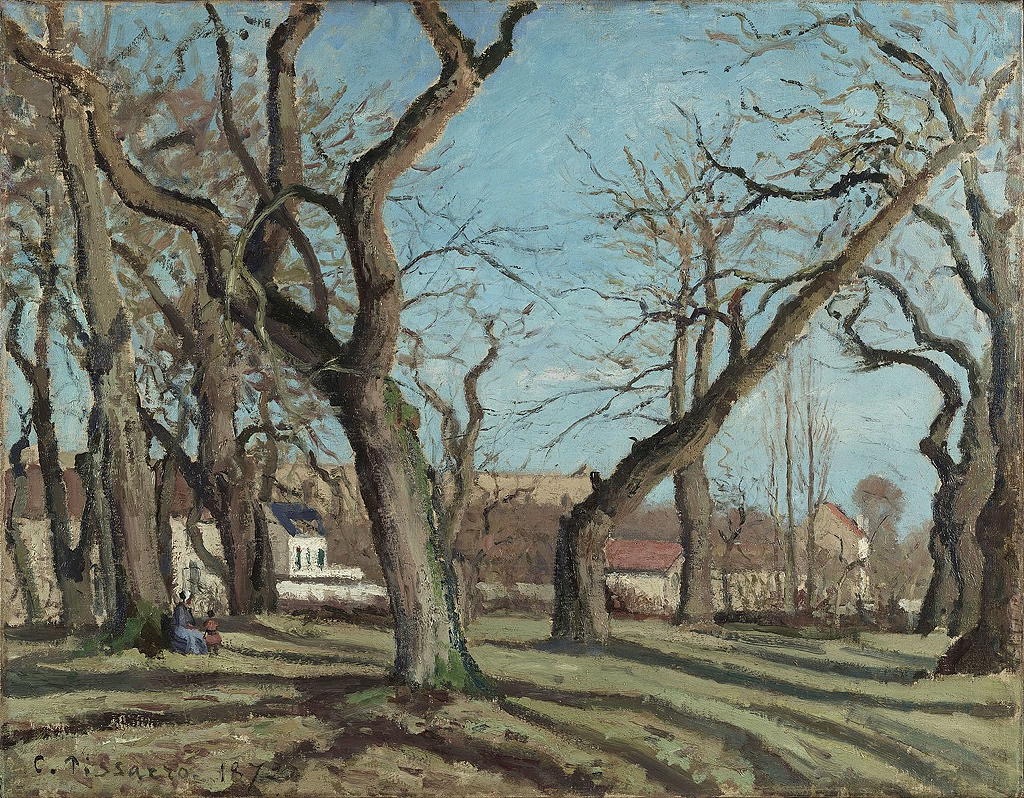
Camille Pissarro: Bois de châtaigniers à Louveciennes (1872)
"We're improvising our exit scene …"
As Our Grand Refurbish neared its end, progress became erratic. Crew called in sick or excused themselves for appointments. Expectations smeared. I feared that we might never finish, that we'd become one of those good ideas that never quite coalesced and remained permanently undone, and this outcome could happen to anyone. We tend to envision an end state but not the last furlong of the race. We seem to expect some sort of grace to nudge us over that last hump, when finishing, Phinishing, might be a unique and separate art, like the kind a closing pitcher practices, almost but not entirely unlike the skills that formerly produced the start and progress. The production mindset seems in need of disruption to finish, otherwise it might just continue to replicate itself into never-endingness. We need the opposite of that now, and it seems likely that we'll have to violate some deeply ingrained habits to pull that off. Phinishing's not just stopping work, it seems a serious disassembling process. Rather than building, we're set to take away now.
The inertia of motion argues against ever stopping.
SpoolingUp
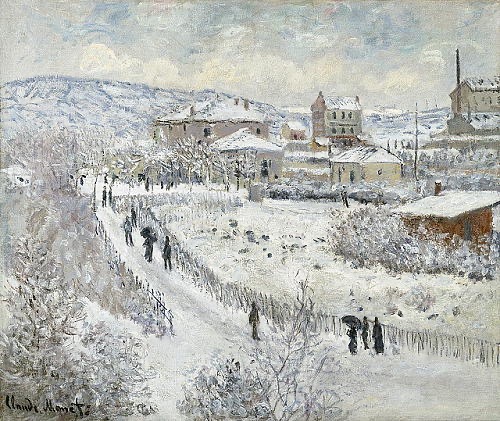
Claude Monet: Snow Effect at Argenteuil [Effet de neige à Argenteuil] (1875)
"nobody ever knows if they even exist … until they manifest on the page."
While I felt myself WindingDownish yesterday, this morning, I sense myself SpoolingUp. WindingDownish mostly involves reflecting while SpoolingUp focuses upon projecting, anticipating, preparing. It's a head-in-the-clouds experience where the future overshadows both present and past. I see the end of Our Grand Refurbish coming, but more compelling, I've started hearing my annual Holiday Poem Cycle calling. The Muse, often ahead, began baking her holiday breads last weekend. I'm just waking up, realizing that I have a dozen or more new poems to write between now and Christmas morning, and that I have not yet started stockpiling possible illustrations to serve as inspirations.
I began this tradition twenty years ago when I became disgusted with the sense of obligation this season wrought in me.
WindingDownish

André Masson: Battle of Fishes (1926)
"I left a few once-shiny screws which I intended to use to hold impermanence together."
Time seems to slow as this year moves closer to its ending. The days grow shorter but feel longer, some days seeming interminable in their passage. I swim through thick molasses on my way toward New Years. This year has been like no other, for this year, I lost my darling daughter, which opened a wound that could never heal and hasn't. It was also a year overflowing with hopefulness, the year The Muse and I undertook The Grand Refurbish, an effort deliberately imbedded with much needed promise. We ended our exile and moved back home but delayed moving in until we'd fixed up the place for our entrance. Here but not yet present, either, we spent the final three-quarters of the year suspended in place, no longer there and not yet here. Now time itself has lost its usual cadence, passing in slow motion if, indeed, it's passing at all. Some days, lately, time just seems stalled.
My notions of progress conflict with my understanding of entropy, this universe's governing quantity.
TechnicalProblems
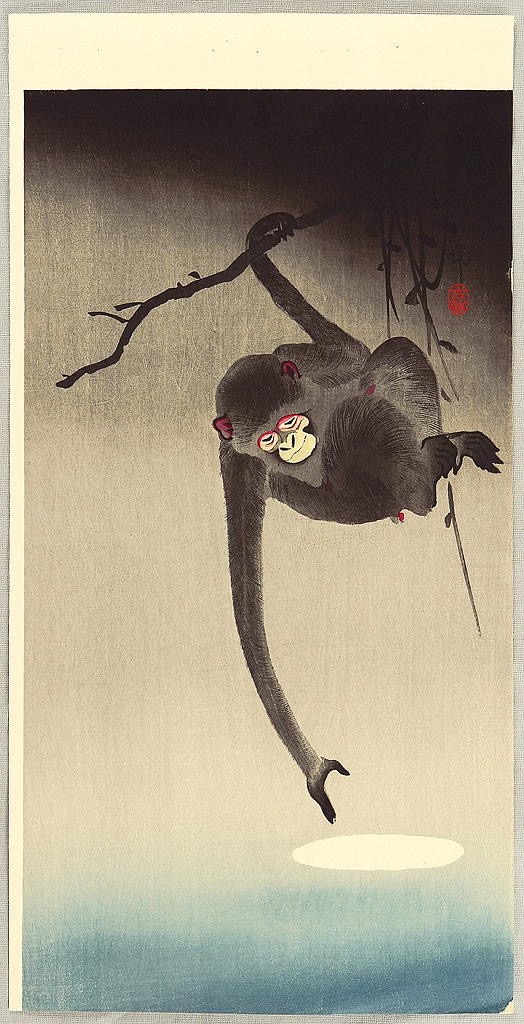
Ohara Koson: Monkey and Moon (Ca. 1900 - 20)
A long armed monkey is trying to catch the reflection of the full moon on the water surface.
"I sometimes, briefly, become the destroyer of my own world …"
I have been using the same blog software for fifteen years but I just barely understand how to use it. It sometimes gives me fits, crashing or otherwise inhibiting my simple demands for it. I chose it over the more popular alternatives because it's a native Mac application and so it works more intuitively, or so I tell myself. It mostly works without me having to know how it works. I'm confident that I only know about 1% of its features, but I almost never need to know any more than that. When I get into trouble, a User Forum provides a channel to connect with users who know one heck of a lot more than 1% of the system's operation. When the User Forum's stumped, I can resort to the developers' help desk, which, being located in Brighton, England, usually takes until the next day to get back to me. It might be every app user's dream to be the one to uncover some fatal flaw in their chosen application, to report it to the developers, and to have them heap praise on the one user who helped them avert absolute disaster. No, that's never happened for me, either. We usually find that my ISP has been messing with me or that I've inexplicably gotten tangled up in my own underpants. I tend to be the source of almost all of my so-called TechnicalProblems.
I complain about the technology, but I increasingly understand that I'm actually complaining about myself.
YardWork
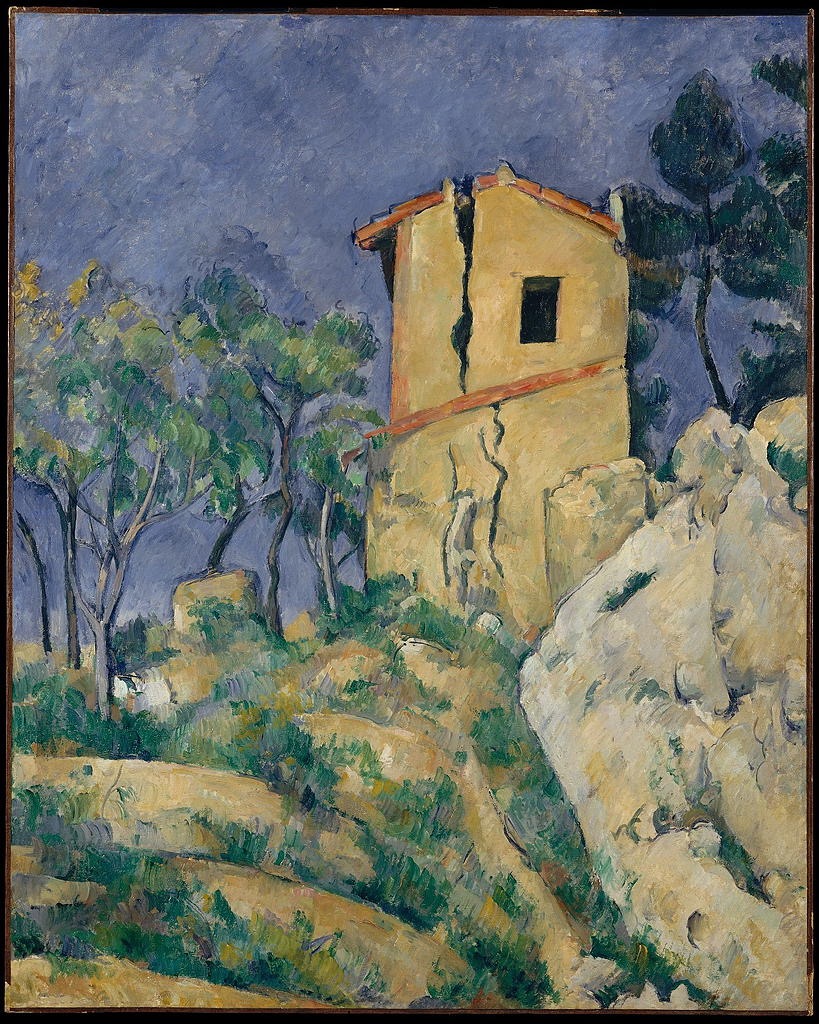
Paul Cézanne: The House with the Cracked Walls (1892–1894)
"My bushes rely upon my heartlessness …"
With the Refurbishment winding down, I found some time on my hands and YardWork needing doing. The winter rains were predicted to begin, after which whatever leaf litter I'd left would become a sodden mess, so I set to play. I do not consider YardWork to belong to the same activity class as labor, or if it does, it falls well within the boundaries of labor of love. It's play, a matter of rearranging orders whether pruning or weeding, it seems to be all about balancing. The weed I do not stoop to pull this time through will remind me what I didn't do the next time I pass through, and will continue to remind me until I decide to do something about it. I keep mental notes about which parts have been begging for some attention. The Refurbish rendered me unavailable to come out to play for months and months. It's reassuring to me that my absence didn't seem to inflict any permanent damage. The yard abides.
I hide my messes behind the garage, around the composter, which is an active mess in continual process.
FestivalOfLights

Paul Cézanne: Antoine Dominique Sauveur Aubert, the Artist's Uncle, as a Monk
(1866)
"The nights are dark but our hearth feels warm."
Because nothing says Happy Holidays like a big, huge bucket truck festooned with lights. Festooned, being one of those words essentially reserved solely for use during December, serves as a big tell as to what's going on. The Muse and I are watching our small city's annual holiday parade, the FestivalOfLights. Main Street, holiday lights off, stands lined with people on both sides as a long line of clearly Homemade floats passes by us. As near as I can tell, the opportunity for families and strangers to wave at each other might serve as the primary purpose of the whole charade. It's equally absurd and endearing. A guy rides by astride a sway-backed Appaloosa playing We Wish You A Merry Christmas on a battered trumpet. No explanation offered or demanded. The crowd applauds. Another big, huge bucket truck rumbles by, lights manically flashing, its advertising unreadable, rider waving, smiling, and greeting. I'm moved to tears.
It had been years since The Muse and I attended a hometown parade.
Monkish

Peter Paul Rubens [1577-1640]: Portrait of a Monk, date unknown
"I mumble my vespers to myself …"
I seem to go through periods, like Picasso's Blue Period, where I maintain most of my focus upon a very narrow range of interests. These periods can last from a few weeks to decades, and I find them both enormously satisfying and ultimately a bit suffocating. Nearer the beginning of these phases, I immerse myself in discovery. A novice then, I hunger for ever more information. Later, I might seem a tad compulsive as I erect and defend strict boundaries around my discipline, my concerns. I might seem heartless to others' perspectives, seriously disinterested, even dismissive of what others might find compelling. Later in these chapters, I might grow restless, feeling as though I might have just about sucked all the goody out that that particular popsicle. I might even grow bored and go AWOL, leaving cohorts in a lurch. Obsession has phases, just like anything else. There's no happily forever after anywhere.
Our Grand Refurbishment has been such a period.
TouchingUp

Detail of the preparatory design by Gustav Klimt for the mosaic friezes of the main dining room of the Stoclet Palace
(Museum für angewandte Kunst, Vienna) (circa 1903)
"The final act of every improvement TouchesUp."
Almost nothing finishes like a horse race does, with successes and failures neatly lined up in decisive conclusion. It's gone in an instant. Most activities end with more of a smear on their lens, approaching finished but never quite there yet, a spin away from conclusion. Eventually, the crowd disperses and the stadium quiets, then one might reasonably deduce that something happened but clearly, if not decisively, ended. An absence replaces a presence and we call that negative space a done. Before drawing that conclusion, though, picky little endings need tidying up. The effort might be largely concluded but not yet minutely finished. In Our Grand Refurbish, cast brass window locks sit atop sashes but have not yet been attached. Several doors remain to be hung and adorned, at least one needing some serious sanding on top in order to fit back into its frame. Little bits of painting remains, too, final coats and ragged edges, a few nail holes still need filling and final dressing, Touching Up. It's like a final accounting before the crew departs the building. The list of needed TouchingUps shrinks but seems essentially bottomless.
I like the idea that the last activities are classified as touching, for much of the Refurbish work seemed a whole lot more brutal, crushing blows and smashing throes, cutting carpeting, extracting tiny staples, floating walls and ceilings, burying past mistakes, hiding unfortunate legacies.
Swarming
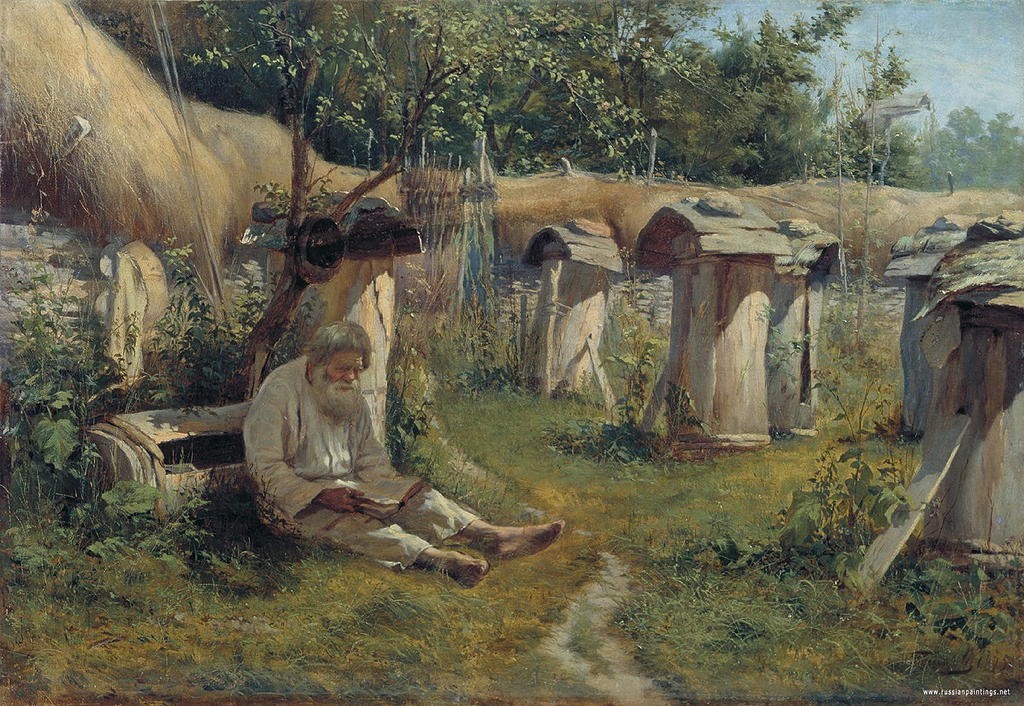
Nikolai Bogatov: Beekeeper (1875)
"They leave little footprints in the dust …"
A swarm of activity erupts from Our Grand Refurbish as we near completion. Completion still seems like absolute fiction. I cannot yet quite imagine our living room unlined with cardboard and not filled with saw horses, paint smells, and an enormous chop saw. Joel Our Carpenter pulled up to the front in his van yesterday to disgorge yet another load of fine-grained boards destined to become sills and trim for the final fresh window. I was poised on a tall ladder painting highlight trim around the last new window while Kurt Our Painter treated library shelves with conditioner in preparation for staining them. Never before in the long months this effort has dominated, has such a variety of activity bloomed at once. I cannot keep up to supervise. Fortunately, any effort as mature as this one shouldn't need much supervision. It manages itself.
It might be that we could not have possibly kept up had this variety appeared any earlier.
Overalls
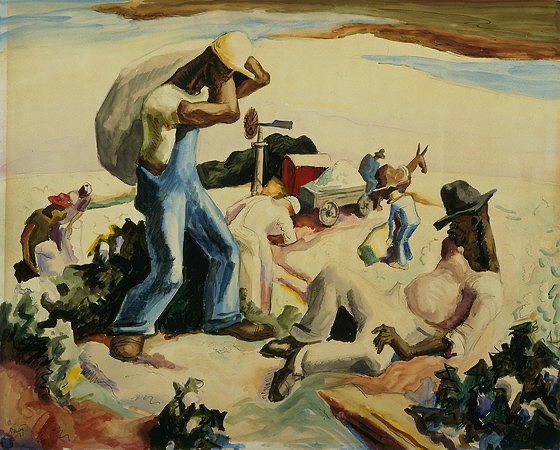
Thomas Hart Benton: Cotton Pickers (1931)
"I can carry a hammer anywhere now!"
Our GrandOther Kylie has taken to engaging in cosplay, wherein she dresses up in the costume of some Manga or Nintendo character for the apparent purpose of becoming that character for a while. Her evident pride and satisfaction as she explains her character's particular proclivities speak to the efficacy of the practice. I, never having heard of these characters before, sort of fuzz over at her explanations because I really cannot relate to them, but I engage in my own curious cosplay behavior which might well baffle anyone else. Just this week, for instance, I started test driving a pair of Overalls I'd purchased online on a whim. I saw them there, on sale, and decided in that moment that they might serve me well, or, better than my then current handyman garb. Through Our Grand Refurbish, I'd ruined three pairs of otherwise perfectly respectable jeans, wearing out the knees on two of them and slopping another pair with so much paint that they're unusable for anything but painting. Further, those jeans lacked the pockets I needed, and their cantilevered construction meant that I spent a considerable part of my day "hiking" them up. They were always sagging.
Something about that photograph of those Overalls caught my attention and in that moment, I'd nabbed the pair.
LineADucks

Ohara Koson: Two Mallard Ducks and the Moon (Early 20th century)
"Faith is not unsupported belief but the belief in uncanny experience …"
I recognize that Our Grand Refurbish has elbowed its way into perhaps more stories than warranted or wanted through this series. In explanation if not apology, Our Grand Refurbish has subsumed most of my foreground and background focus for many months. I've recently been bemoaning absences, primarily of closure, for this party's extended beyond celebration and nudged into a wicked form of self-punishment. What began with enthusiasm, albeit naive, evolved into frustration as the end game refused to coherently line up. Each attempt to decisively end the effort found only a fresh barrier preventing further forward movement. Reliable suppliers failed us. Sick days stalled us. Weather drove us inside. We could see what still needed doing but we could not quite manage to get there from here. I knew that something important was missing but I could not clearly state what that something might have been. That absence was not prescriptive.
I recognize that this was always how endings emerge but I'd somehow lost accessibility to that knowledge.
RushTheExit

Ohara Koson: Geese and the Moon (Early 20th century)
"Hasten home slowly. This ending's just begun."
I suspect a cultural imperative if not an innate human tendency at work, the one encouraging people who paid fifty bucks a ticket to leave the game in the middle of the seventh inning to, as they might claim, "beat the traffic." One might beat the traffic better by lingering until well after the game ends, until the parking lot's emptier, but that tactic seems to violate that imperative or tendency. Even at big games and popular concerts, where tickets cost hundreds, even thousands of dollars, one sees some percentage of the audience RushTheExit before the event even ends. We might become lemmings, ready to follow others' leads to our own demise whenever an ending threatens. The end will come but we seem to want our endings on our own terms and so we rush them. Our Grand Refurbish has been threatening to end for a fortnight now, but once it started throwing off serious intimations, progress stalled. Joel Our Carpenter came down with something that kept him off the job for a week after supply issues added a few days to our imaginary timeline, both conspiring to add tension to the conclusion. What operated as a relatively care free enterprise for months has become a pain in the butt to live with and I feel more than ready to simply wash my hands of whatever's left. I ache for doneness.
Such conditions might breed disaster, for they erode the patience which has thus far fueled our forward progress.
Pastiche

Das Leben ist schön: sculpture by "Leonardo Rossi", a fake name often used for plagiarized bronzes
" … respectfully mimicking itself in mom jeans."
As a lifelong member of the once highly-touted Baby Boomer generation, I regret to report that I'm apparently no longer a member of any demographic any retailer cares about. That mantle has passed to those who came of age after us. I'm wise to shop for clothes in vintage consignment shops. Few people now write books with my sensibilities in mind. Food has swerved toward both the bio-deplorable and the chemically-enhanced. I swear someone wants caffeine added to everything so they can call the result an energy source, that and bull pee, which has seeped into more than just the terribly regrettable Red Bull®, more an addiction than a beverage. Members of the generation just behind me are struggling to kick habits nobody had even invented yet when I was in my prime. Finding halfway decent jeans that fit without looking like they were tailored for mom has become essentially impossible. A tee shirt without either a brand name or some meaningless meme printed all over it might no longer exist. Do they even make clothes in innocuous colors anymore?
We have become a Pastiche society, one dedicated to emulating rather than creating, copying rather than originating.
Hinges&Doors
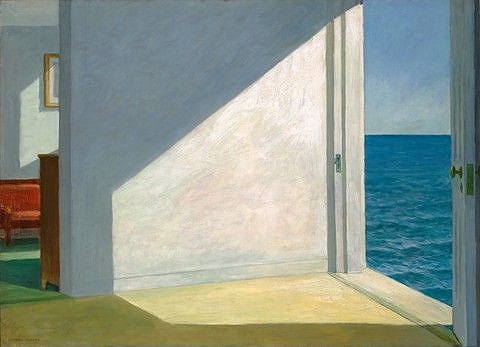
Edward Hopper: Rooms by the Sea (1951)
" … blind man coping as the pinnacle of engaging."
Our Grand Refurbish has depended upon many contributions. Our workers, who serve more as artisans, and whom we have fairly compensated, still contributed their non-refundable time to help us realize our fuzzy intentions. They gave away their care and attention. Reassembling the place after transformation depends upon tiny things, most prominently, Hinges&Doors. The doors, dedicated readers will recall, filled my playbook during the early to middle Refurbishment periods. I scraped and sanded each face before repainting it. They seemed finished works of art then, merely needing hanging, until hanging proved to be the most difficult part of the operation, with no merely in it. Hinges, you see, complicate everything. Hanging a door on its hinges becomes a two-man operation, with a third hand handy, involving grunting, hammering, and cursing. A few doors slip right onto their anchors, but most require a little adjustment, a little manual reasoning before they'll fit. Once mounted, the door might not quite sit squarely within its frame and require further hinge adjustment or a little frenzied sanding or planing along its top or leading edges. It seems wondrous when any of them work. I hold lingering doubts that all of them ever will.
One disassembles and one takes chances that something might not so seamlessly reassemble again.
NormalImpossible

Ohara Koson: A Crow on a Snow Covered Tree Stump (circa 1930s)
" … that sense that you're on the verge of being found out to be a fraud and mustered out of the club."
I so routinely engage in impossibilities that they hardly register anymore. Much of what I initiate might beforehand be much more easily proven impossible than likely, yet I proceed, often in sublime ignorance of the utter impossibility I'm initiating. I've usually convinced myself that I'm starting something rather normal, and I often am, but NormalImpossible, not any of the infinite other varieties of normal available. We might benefit from a quick declaration of definition here so that we might share a common meaning, if that's even possible. I declare the NormalImpossible to feature so much exploding variance as to render it finitely unplannable, untrackable, and uncontrollable. An exploding variance shifts due to more than a few [let's say, three] influences, moves unexpectedly or stealthily, and contains many mutually distracting moving parts. To focus upon any part of a NormalImpossibility is to render the observer essentially blind to the rest of the mechanism, producing a blind observer effect where one observer proves insufficient and more than one cannot agree upon what they've seen, producing a Blind Men and the Elephant situation, all perfectly normal in my experience engaging in NormalImpossibles.
One of the more prominent features of the NormalImpossible situation has always been the apparently normal human tendency to perceive them as much simpler than one could possibly prove to be.
Evocations

Ohara Koson: Autumn Grass (1900-30)
"My feelings live close to the surface here …"
The Villa smells of pumpkin custard this early morning because The Muse was baking Thanksgiving pies last night. A pecan job rests beside the pumpkin on the kitchen counter. A extremely large-breasted turkey rests, air-drying in the garage refrigerator. A low ceiling hangs over this valley. A crane-shaped airplane, the morning flight to Seattle, just roared overhead. I suspect that it was filled with people heading off to spend this holiday with family, though I don't know that for a fact. I know little for a fact, though I seem to sense plenty and make sense that way. I mostly make meaning not by knowing but by feeling. I read Evocations emanating from things and those vibes serve to inform me. Were it not for this sensory capacity, I would seem just as ignorant as I truly am. It's not a sixth sense, either, but the judicious application of the first five.
This town evokes memories from me. It plays me like a cheap guitar.
FallingsForward

Ohara Koson: Hunting for Insects (1900-10)
"All progress seems to come from FallingsForward."
Years ago, a client asked me to review a project management course book he'd hired a BIG three consultant to create for his firm. The manual began by recounting many "failed" projects, adopting a backdoor don't-be strategy for teaching its subject. I found this approach odd, especially since the "failed" projects had all also been widely recognized as wild successes. The Sidney Opera House was mentioned, a notoriously failed scope and budget containment process that produced perhaps the world's most beautiful building, which was quite a trade-off. Would the world long remember the cost overage or might it move on to enjoy the remarkable fruits of its curious labor? And so the book continued.
I mention this experience because Our Grand Refurbishment, largely a blessed endeavor, has started experiencing setbacks.
NewFashioned

Ohara Koson: Kingfisher (1935)
" … new traditions never intended to become our future imperatives."
I understand just as well as any next person the sacred obligations each holiday lays upon us. We are each enjoined to at least attempt to recreate some utterly mythical, paradoxical ideal scenario in homage to some past that never actually happened, the purpose of which always gets promised as contributing to the net volume of joy in this world or gratitude or something. It's always something. We go as crazy as an ant hill on fire to achieve the understood ideal. Seasonal Affective Disorder (SAD) often results, and understandably so, for given an absolutely unachievable necessity, you'd have to be crazy not to be driven insane by trying to pursue it. Still, when Thanksgiving comes around, we're inevitably dusting off the old Pilgrim hat, often unconsciously, while envisioning ourselves in a Normal Rockwell illustration of the mythical grandma and gramps laying an impossibly huge and perfectly roasted turkey on an already over-laden table. The thought of achieving anything less should depress you. When it comes to holiday celebration, it's damned whatever you do when recreating. We hold OldFashioned as our standard. Might NewFashioned hold some promise?
I was reminded of the delight accompanying NewFashioned when looking at our newly-fashioned window and door trim, which our carpenter fashioned to suggest a heritage they clearly never held.
HomeAwayFrom
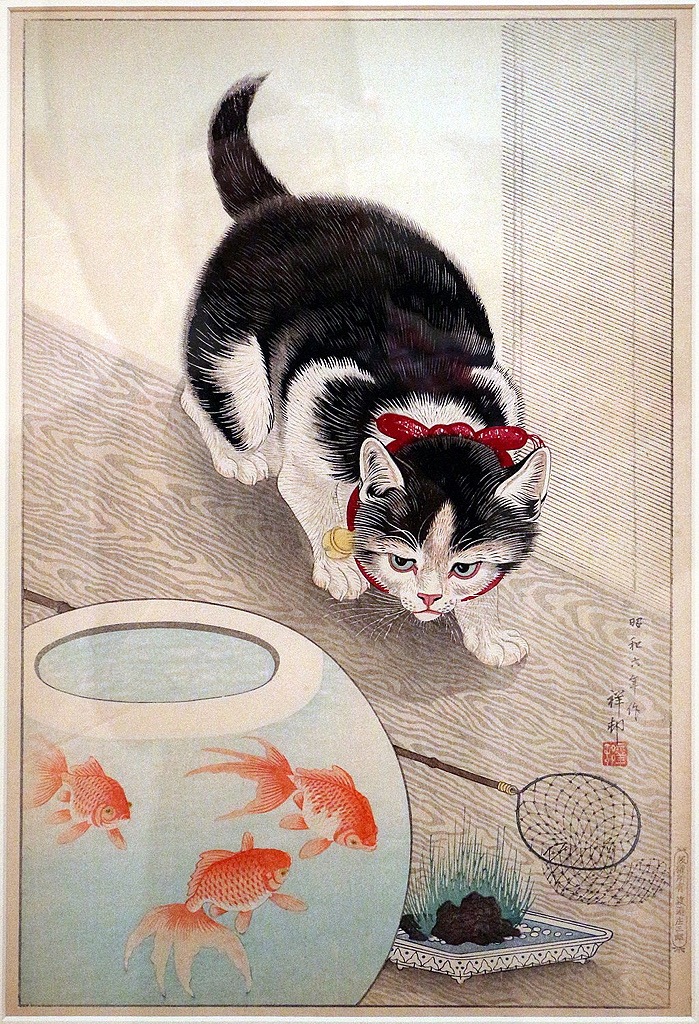
Ohara Koson: Cat and Bowl of Goldfish (1933)
"We didn't find home lurking there, either …"
Though I lived almost half of my life in this SouthEast Portland, Oregon neighborhood, I always felt afraid here. When my first wife and I arrived in late 1975, fresh from a couple of years living in a small city in Northeastern Pennsylvania, Portland seemed huge and threatening. We found a small apartment on a major thoroughfare, just across the street from a massage parlor and on a major bus route, and settled in as if surrounded by an unseen but ever-present enemy. My wife's parents had lived in a tiny garden apartment just around the corner when they were first starting out, so I suppose that we might have found some sense of home here, but we never did. It didn't help that my wife had taken a job in a hospital that she didn't like or that I was trying to break into an unfamiliar music scene. I then still fancied myself a single acoustic performing artist. I was good at what I did, but disco threatened. I was teetering on the decision to enroll in the local state university and get out of the business, working casual labor jobs in the warehouses surrounding our apartment. I let go of a defining dream in this neighborhood.
I return now because my son and grandkids live in essentially the same neighborhood, a dozen or so blocks from that first apartment, in an apartment of their own.
Humpty

Ohara Koson: Two White Geese (Japanese, Meiji era, beginning of 20th century)
" … stripping out soft brass screw heads and struggling with heavy things."
Humpty Dumpty sat on a wall.
Humpty Dumpty had a great fall.
All the kings horses and all the kings men
Couldn't put Humpty together again.
-Traditional Nursery Rhyme
The Villa Vatta Schmaltz seems to be experiencing a bout of Humpty as The Muse and I try to put The Villa back together again.
CatchingShadows

Ohara Koson: Six Geese and Shadows (1926)
"Slowing down and showing up …"
I seemed somehow primed to anticipate that The Law of Unintended Consequences would tend toward rolling snake eyes, the worst possible outcomes, but Our Grand Refurbish has produced more counter examples than supportive ones. On samples, The Muse's choice of color seemed unremarkable, perhaps bordering on regrettable, being a shade of grey, for cripes sake, but in practice, it became a chameleon color, capable of surprising variations depending upon even small changes in light and shadow. Rather than drab grey walls, The Villa now has vibrant technicolor ones, each corner marking at least a subtle shift in color or texture, each angle shifting the nature of each room. It's all more than a little bit overwhelming, for the rooms seem to be in continual motion. Leave a room and it will have changed by the time you return. Step into a room and some subtle or significant shift might imprint. The place seems to have grown at least one additional dimension.
I'm most impressed with the Villa's new proclivity for CatchingShadows.
GooseChasing

Ohara Koson: Two white geese swimming by reeds (1928)
"I'd chase more geese any time it's possible."
Near the end, usually, an opportunity appears to turn tedious ladders into rapidly accelerating chutes, an apparent shortcut appears. Of course, by long tradition, most anyone would grab this opportunity like the lure it most certainly seems, rubber worm and all. Even I, experienced refurbisher now, fell prey to this call. Our carpenter had located the material he needed to refurbish the long window seat and shelves in our soon-to-be showcase library. Those boards were in Portland, 245 miles away, and the supplier couldn't say if FexEx® would even consent to ship the stuff. I volunteered to drive over and back to collect the boards, insisting that they be no longer than five feet so that they'd fit into The Schooner. Joel Our Carpenter missed the confirming call and by the time he'd caught up to it, the outlet had closed for the day. That was Wednesday.
We parted that evening with the understanding that Joel would call me just as soon as he'd confirmed that the order was ready.
Adopting
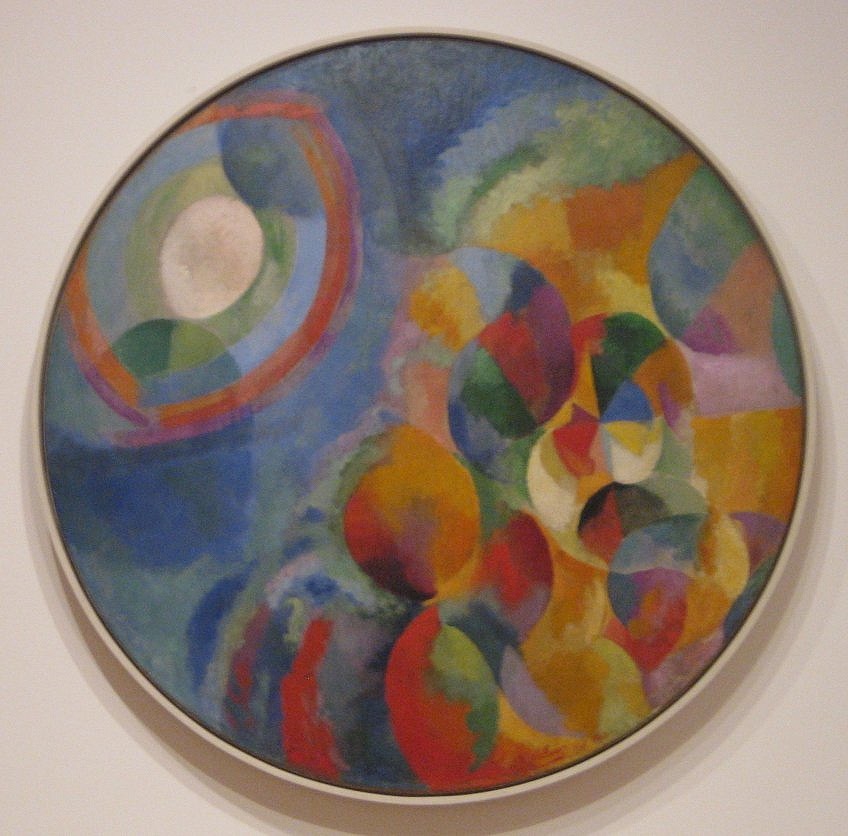
Robert Delaunay: Simultaneous Contrasts: Sun and Moon (1912–13)
" … will we regale them of stories of what was once there but is there no longer?"
The Muse and my relationship with our beloved Villa Vatta Schmaltz does not very much resemble a marriage, marked as it has been by extended absences. Nor does it look very much like a birth family deal. We do not share DNA. Our life here more closely favors Adopting, for we've taken this place into our family and, or so it also seems, this place has been steadily Adopting us. It's a curious relationship in that The Muse and I have been largely focused upon improving this place since we first moved in, and pursuing improvements might be hints that we're criticizing our adopted family member. I think my second wife and I got hitched on the prospect of who we might become together, but the differences between what we were and what we might improve into got us before we could arrive at our destination together. There's something genuinely poisonous about focusing upon achieving future improvements. Nothing turns off the present and no future directly influences anything before it, though the sense that we're not quite there yet can tear asunder even the truer loves. We are always here yet and never quite there yet.
That said, we love this place as if it were family.
Spurt
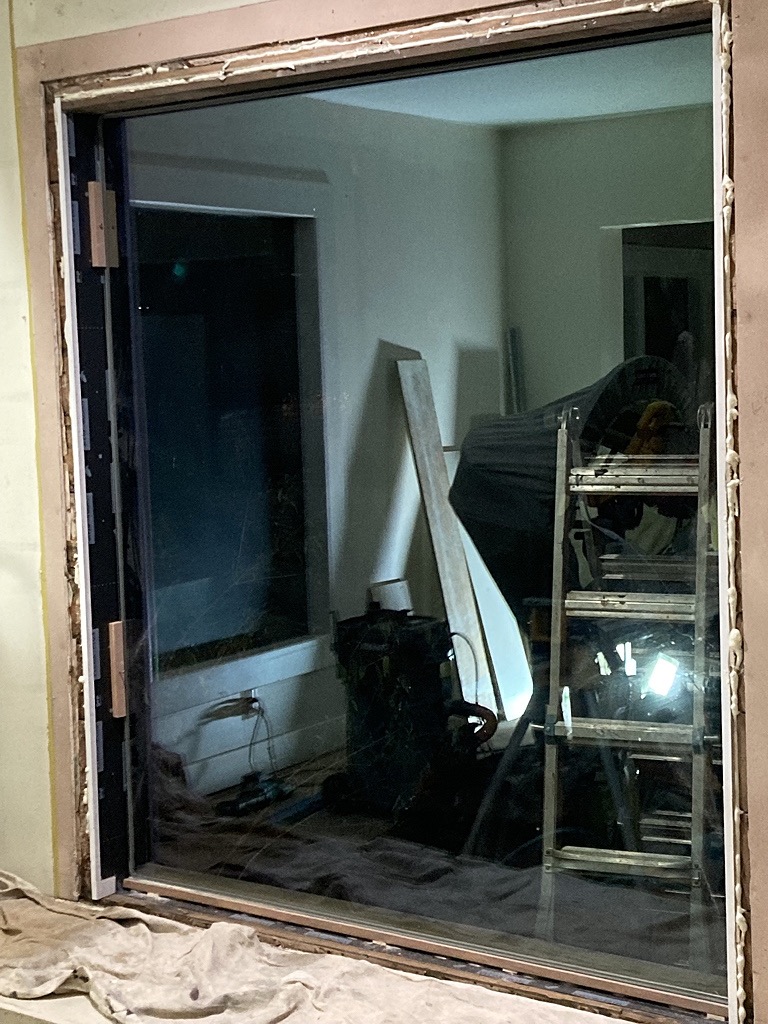
Reflection in freshly-installed front window in The Villa Vatta Schmaltz
"I'm inhabiting what was then just aspiration …"
Wasn't it just yesterday morning that I complained about The Grand Refurbish moving forward in slow motion? By noon, I found myself struggling to keep up with a pace I had not anticipated reappearing. This experience served as another reminder that time, contrary to popular misconceptions, does not move in any consistently regular fashion. It moves by Spurt and stall, by fits and starts. Clocks apparently more or less accurately track an average rate of time's expansion, a smoothed representation of a much more chaotic phenomenon. Clocks inexorably misrepresent actual experience and easily influence anticipation. When time seems to move slowly, which it sometimes does, it seems as though it might forever thereafter continue so moving, never any faster. When time whizzes by, as it also sometimes seems to, who takes the time to consider that the apparent velocity of time probably amounts to an illusion? You could be sitting right beside me and we could be experiencing time completely differently without ever noticing how our individual experiences differed.
It should be no surprise that Our Grand Refurbish still carries a surprise or two inside her.
Disarray
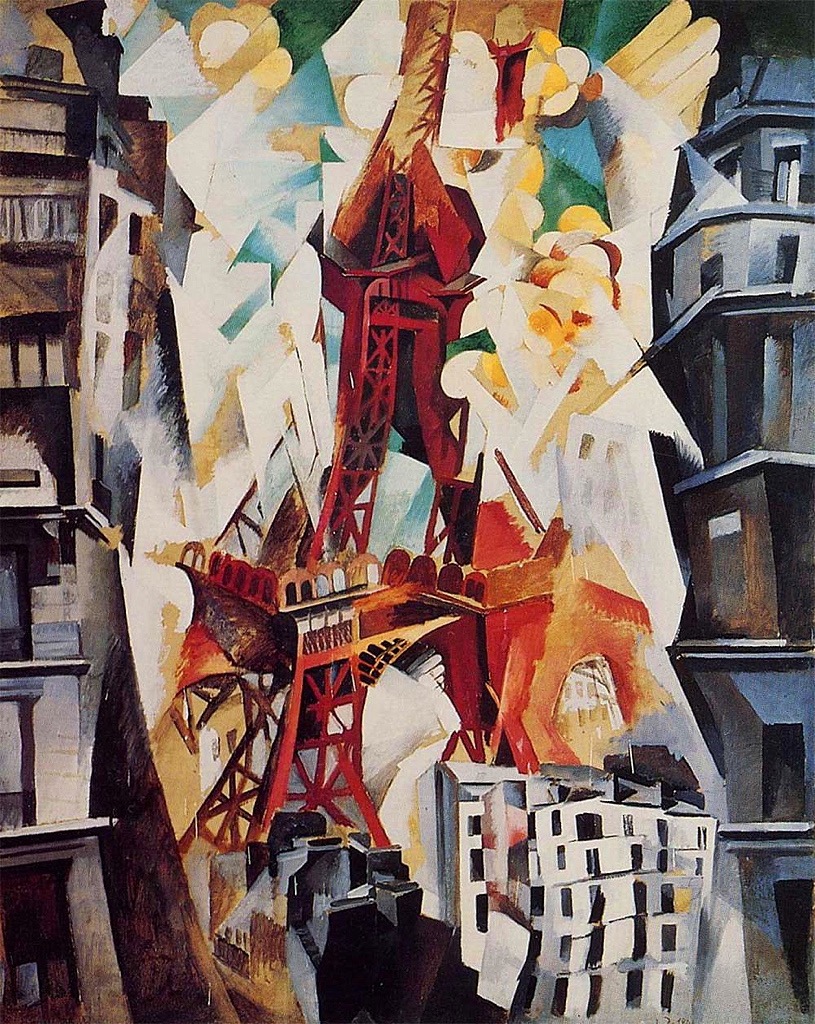
Robert Delaunay: Champs de Mars: La Tour Rouge (1911)
"We might never finish, but we're real close to done …"
I can tell that The Grand Refurbish nears completion because the house seems in ever greater Disarray. I'd imagined that as we finished rooms and even started re-inhabiting them, that the clutter might recede. Certainly, the second floor now holds only traces of the messes that dominated there for weeks and weeks, but as the effort has concentrated on the final two rooms, the materiel necessary to affect the remaining changes have been crammed into an even smaller space. I'm forever tripping over something and have taken to avoiding the workrooms unless its before or after the work day. The painter needs his space as does the carpenter, and I can do whatever I need to do in there off hours, though most of what I do in there amounts to tripping over something or tidying up, even though I know for certain that the surest way to increase the net sense of disarray involves somebody tidying up for somebody else, especially if its done without first seeking advice, counsel, or permission. The living room and library are currently in such disarray that they disturb me. I feel moved to nap through the balance of this effort. Wake me when the clutter's gone. I have no stomach for it.
Last week, The Muse cleaned up a mess I'd made by creating one of her own.
Taping
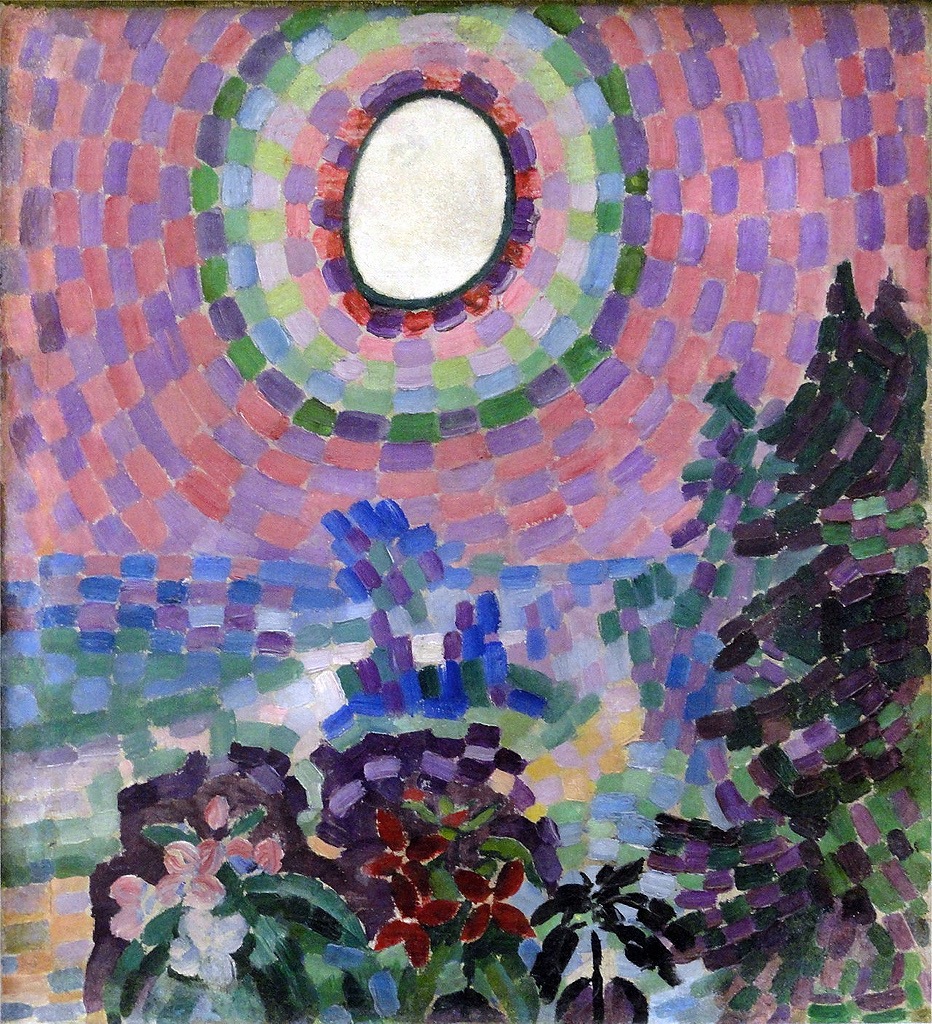
Robert Delaunay: Paysage au disque (1906–07)
" … a final fit of preparation before the legacy begins."
I noticed as I was finishing applying the first coat of paint on our newly installed living room window's exterior, that I had spent more time preparing to paint the window than I had spent painting the window. This tends to be the case with most home improvement activities, yet I don't usually focus very much attention on the preparation, more often perceiving it as a distraction from the real operation rather than the lion's share of it. Like many, I suspect, I don't have much stomach for prep work. It often seems tedious. It produces little lasting effect, its chief benefit being what it lends to the final result, but it leaves few if any footprints. It's enduring value falls under The Dog That Didn't Bark category and gets lost in rounding.
Yesterday, i was Taping the window trim I was intending to paint, this to reduce the likelihood that I'd slop the paint color where I didn't want it.
NotNoing

Fernand Léger: Contrast of Forms (Contraste de formes) (1913)
"I'm uncertain if anyone can ever outgrow that stance."
I want to speak this morning about an increasingly common situation, a form of deliberate misapprehension wherein people seek, often with considerable passion, information they might otherwise reasonably suspect isn't true, either due to its source or its form. This information often seems overly convenient, perfectly satisfying an expectation long accustomed to disappointment. It might come from a source long-acknowledged as unreliable or partisan, someone with the reputation of saying anything that might rile someone. The effect of such a transmission, deliberate misapprehension in and self-destruction out, seems perfectly represented in the vaccine deniers proudly standing up for their superior understanding and patriotism. Their position doesn't quite seem stupid, but more intentional than that. It mostly appears belligerent but without clear purpose. The self-satisfied expressions these possessors of negative knowledge display leaves me feeling 'sore afraid.'
This position seems the sole of Homemade.
Hearth
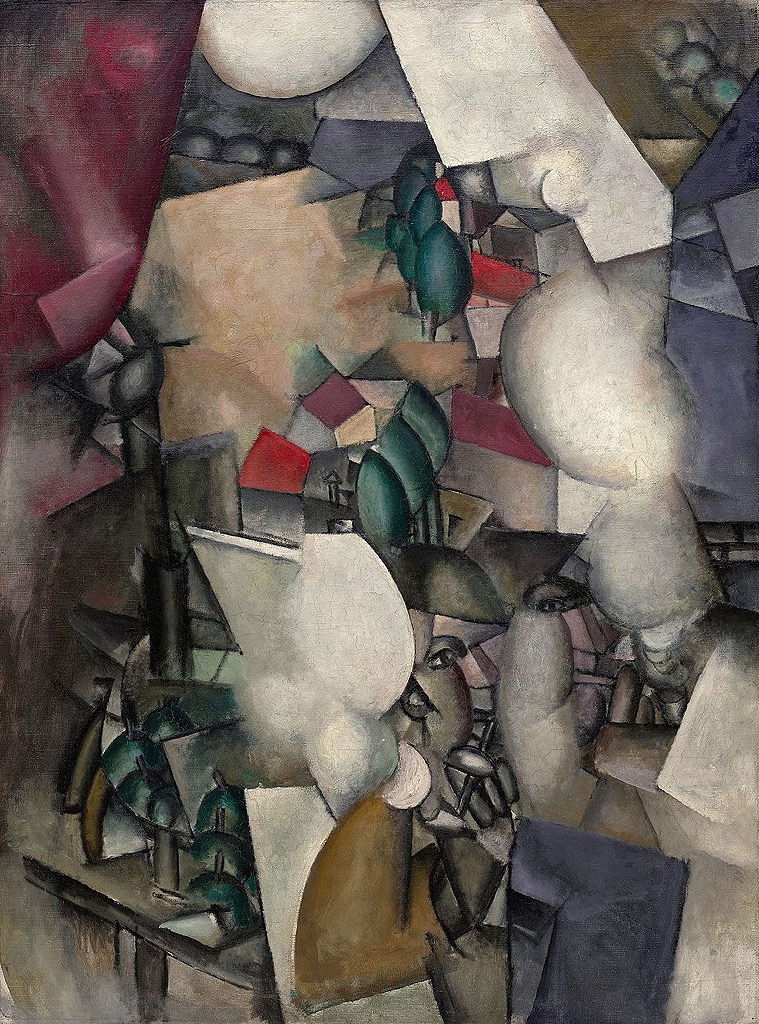
Fernand Léger: Les Fumeurs [The Smokers] (1911–1912)
" … a naked Hearth can no more stand than can a naked heart."
Determining the center of anything can pose a difficult dilemma. Like determining best, insufficient information often exists to declare any definitive answer.—(Huh? How could insufficient information exist? Sufficient information doesn't exist. A surfeit of insufficient information couldn't exist, but then it's a negative quantity, so I guess it gets counted differently.)—Further, one might declare centers for a variety of attributes or elements. An emotional center need not resemble a physical or intellectual one. At some level, I suspect that every element might be reasonably declared the center of something, if only a temporary center of attention before consideration passes. I bring up this question because it's come up within our Grand Refurbishment. Our color palette first held central attention. Then, door and window trims. The banister rightfully held that space for a spell. So did the stairs. Now, the living room windows and the cleverly designed library wall, but each foci in turn slipped back into an other than central position as the refurbishing machine rolled on. As it nears its destination, one glaring element remains unaddressed, though not unconsidered: The Hearth.
If any element of any house can rightfully be considered its center, I suspect that the Hearth usually holds that position, if only due to the sense that Hearth IS home and thereby irreplaceable.
Removals
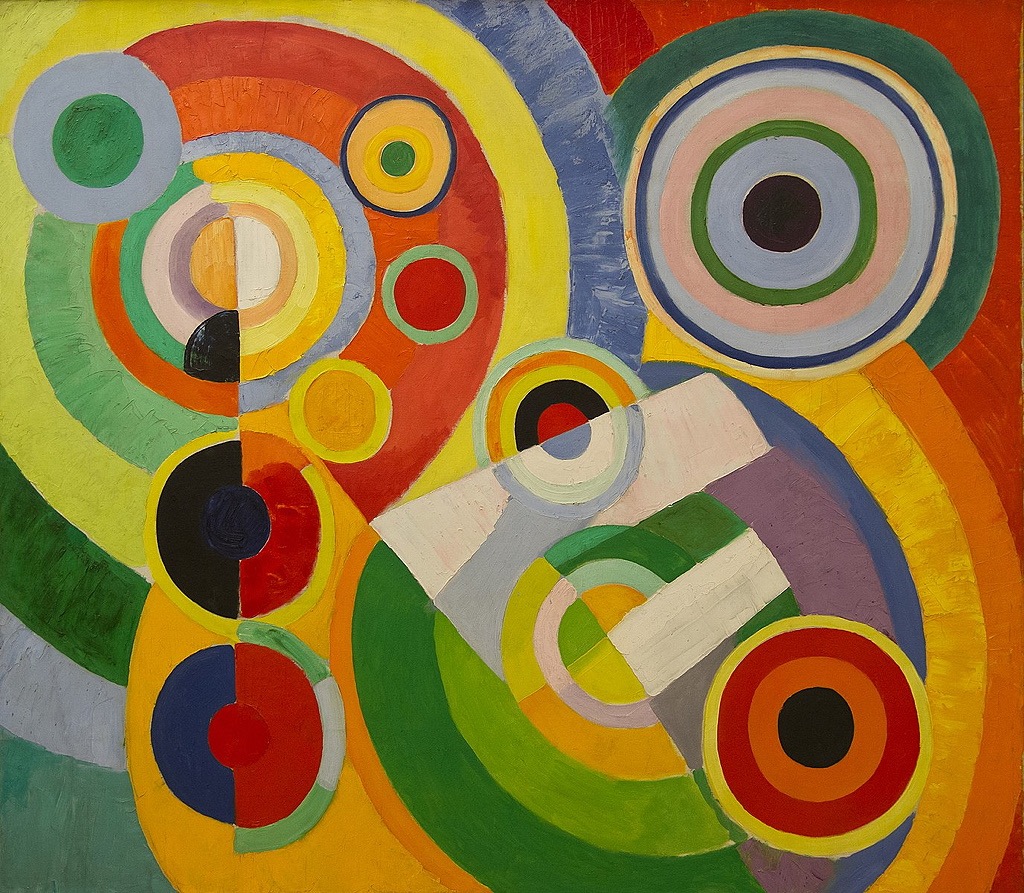
Robert Delaunay: Rhythm, Joie de vivre (1930)
" … indistinguishable from madness and joy."
I believe that we've already established that destroying's more entertaining than creating and that some work seems better suited for kids, or at least the kid inside. While Refurbishing might seem a net creative act, one must sort of blank the palette before painting, and much of the prep work comes in the inherently satisfying Making Waste category, by way of Removals. None have proven half as satisfying as removing wallpaper, though, for wallpaper mostly exists as a criminal enterprise. Often hung in lieu of fixing the underlying wall, it hides deep dark secrets, albeit poorly, thereby keeping them alive. The one who chose the wall covering might have once upon a time been satisfied with their choice, but they long ago passed on, leaving their handiwork behind which aged just as poorly as they did, yet it's still on display. In our old place, some mid-seventies remodel, we figure, left the music room/library bordered with a gilded paisley burgundy specimen, the garish out-of-placeness of which, we once sort of reveled in. The time had come to take that down.
I tried reasoning with the stuff, spraying it with warmish water and adding patience, but it would not release its grasp.
Odds&Infinities
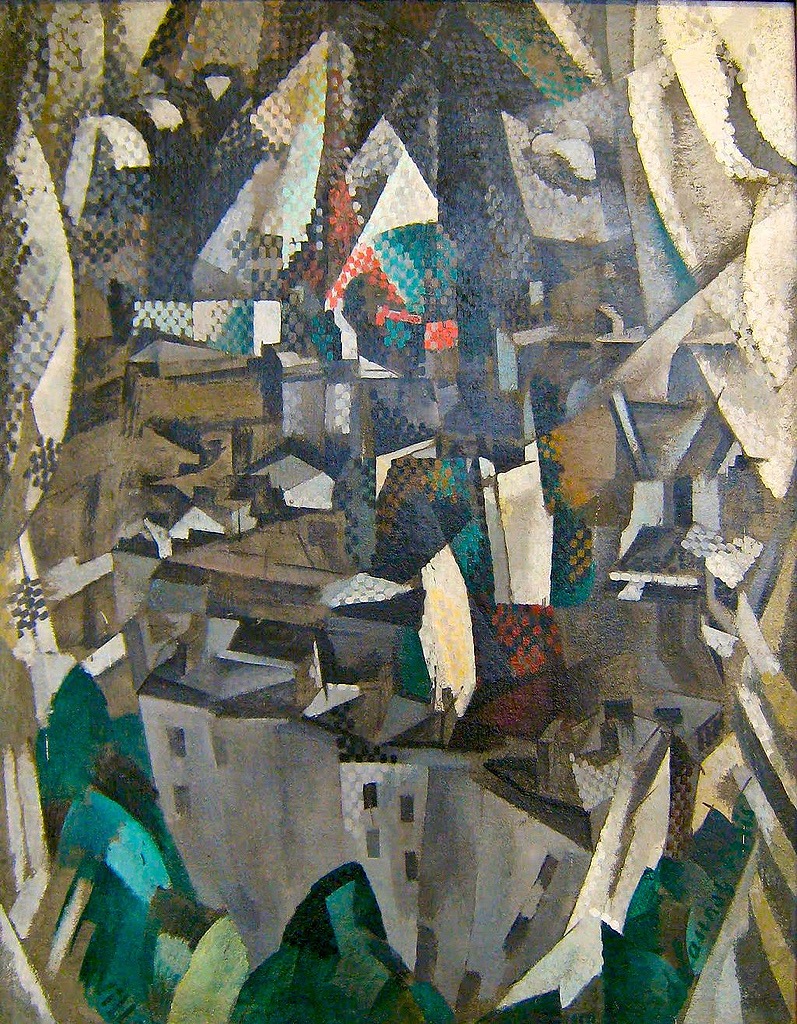
Robert Delaunay: La ville no. 2 (1910–11)
"I leave muddy footprints wherever I walk."
The Grand Refurbish has resolved itself into two contiguous rooms. The upstairs will be complete later this morning, save for a few what might be called odds and ends but which I suspect some of which will very likely become Odds&Infinities, as we'll likely never fully resolve them. I've got that rebuilt door with the odd latch inset which could use some additional carving out but seems too thin for chisel work. The Muse's desk, the base of which I broke when disassembling it and needs rebuilt, blocks reinhabiting that whole room and threatens to become an infinity of its own. Our Carpenter Joel breaks new ground but leaves a few small relatively insignificant undone bits in his wake. Nothing huge or noteworthy, small infinities which don't threaten to break anything or anybody, but still sort of wear on me.
My life includes many, many Odds&Infinities.
KindWind
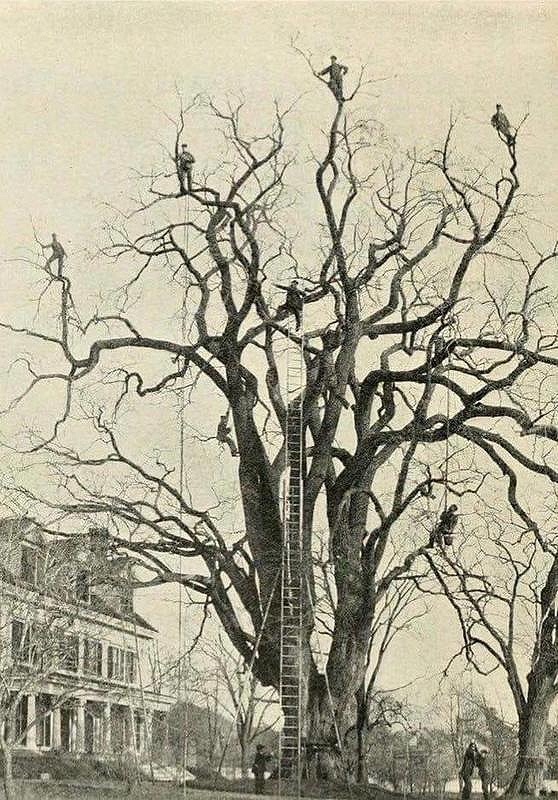
Unattributed photo of tree pruning crew, late 1800s
"… all things seem possible."
By mid-November, Autumn color's had its day. The enormous Maple takes to sporting an embarrassing combover, the crabapples have gone bald, and the sacred apricot has yet to lose a single golden leaf. The snowball bushes and the hydrangeas seem unaffected and the dogwood's apparently indifferent, still almost fully populated with scarlet leaves. The side yard's a shuffler's heaven, and I choose to leave those leaves where they've fallen, the better to overwinter whatever lies beneath them. I was once a fussy gardener, but no more. I pull no production-quality clean-up performance like some of our neighbors put on, like I used to, seemingly chasing down each freshly fallen before it hits the ground. My lawn will sport bare spots whether covered with leaves or not and besides, I've got a secret weapon. If history can still be counted upon, a Kindwind will soon descend and effectively put an end to the autumn leaf problem, which was more of a feature than a problem, anyway.
The Kindwind blows in off the Northern Pacific, bringing strong winds for this valley, sustaining at around twenty-five with greater gusts.
UnBoxing

Unattributed photo of stacks within old Main Branch of the New York City Public Library, pre-1955, now demolished.
" … by the grace of something …"
I had not noticed. How many could provide the same testimony? They hadn't noticed. An absence does not always or even often make itself felt. The hole, having no content, doesn't seem to exist. Empty often defies definition. Name the dog that didn't bark.
I put my books into boxes eight months ago, and there they sat as The Muse and I moved a third of the way across the country.
Scarin'Myself
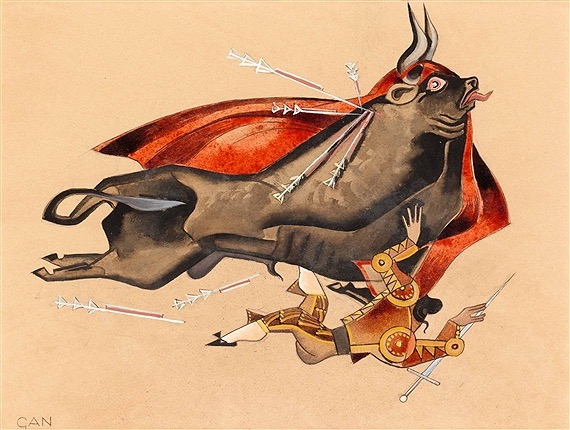
Gosta Adrian-Nilsson: TJURFÄKTNINGS SCEN [Bullfighting Scene] (1934)
" … at least in my own mind …"
I hold the firm belief that it's inherently healthy for me to occasionally scare myself. This amounts to a philosophical position, however, and does not always or even usually translate into me frequently so engaging. I remain a ninny at heart and am apt to fuss over any operation near any edge and that's double for heights, so when I challenged myself to take down the long-standing and little-used scaffolding, it amounted to a big and rare event. I went looking for The Muse to help, but she was impenetrably occupied on a call, so after re-re-re-re-re-thinking one final time, I climbed to the top and started disassembling.
Were it not for the height, scaffolding could be simple, but altitude makes all the difference.
StartingInto
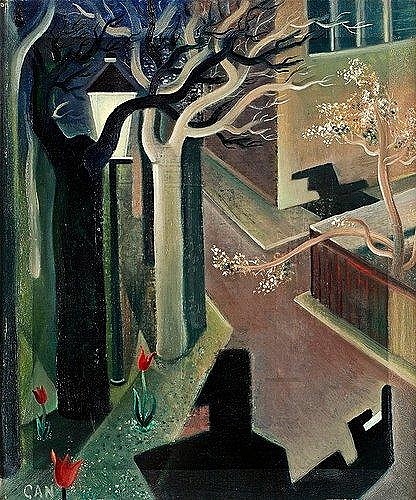
Gosta Adrian-Nilsson: Shadows, twilight (1929)
" … finally coming back into focus."
The Muse insisted upon cleaning up what would become my office. After refurbishing, it was shrouded with a thick patina of dust, first from my removing the ancient wall-to-wall carpeting, then from sanding woodwork, wall, and ceiling patches. The room, before refurbishing and just after, had served as a warehouse for displaced stuff from every other room on the floor, so even the fresh flooring was spattered with spots of spackle, sawdust, and paint. She bravely waded into the mess and I disappeared myself down into the kitchen to set a pot roast braising. I gave her a good hour, perhaps a little less, until after I'd heard both vacuums start and stop and a long silent period probably signifying mopping up. She'd cleared that table I'd used as a catchall during the work and seemed ready for some help shifting stuff. Bookshelves, which I'd stacked on their backs in the middle of the room to facilitate crown moulding and baseboard installation, needed dusting and fresh felt feet. The carpets they laid upon needed rolling and the rest of the room wanted vacuuming, sweeping, and mopping, too. I helped arrange stuff then played scarce again.
I realized that I was not so much moving in to this room, but StartingInto it.
Kittening

Gosta Adrian-Nilsson: Figurer I Trappa (1923)
"I suppose that their feral beginnings serve them well."
Two years ago this week, Max came to live with us. Max was at the time a six month old feral kitten who had been captured, separated from his family, neutered, nurtured through a few common feral diseases, and held in a cage until we arrived to liberate him. He was mildly appreciative, not openly hostile, but very wary. I learned later from the shelter that the man who had captured Max resembled me, so I probably looked like the enemy to him. I set about disconfirming his initial impression of me. He became curious.
A few weeks later, we brought Max's sister Molly home from the same shelter.
OpeningCans
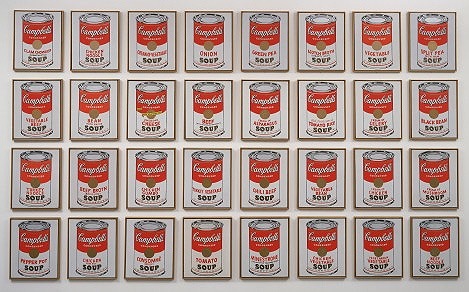
Andy Warhol: Campbell's Soup Cans (1962)
"A pantry in name only."
It occurs to me, finally, that This Grand Refurbish never was about demonstrating any particular wizardry, but about OpeningCans. A can serves as perfect camouflage for whatever's inside it, each uniform and seemingly holding the same contents. One must rely upon faith in labeling or blind habit to determine the contents before opening. The contents never seem quite like I've anticipated. Tuna might show up as a fine filet or as a slurry. Soup definitely needs warming. Peas just need throwing away. What was I thinking? I think OpeningCans serves as an everyday courageous act, one asserting ability, putting something on the line. OpeningCans screams that I've accepted full responsibility for dealing with the contents, whether they be worms or just what I'd imagined.
Our Grand Refurbish has opened so danged many cans that our little crew seems to have at least mastered that act.
Seized
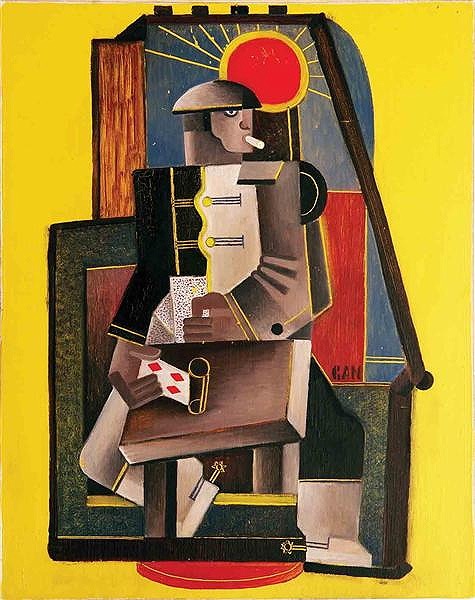
Gosta Adrian-Nilsson: Soldat (1917)
" … identifying now-or-never opportunities that will most certainly extend our efforts even further …"
Our Grand Refurbishment has become an audacious act. Before we began to understand the magnitude of the effort, back when we still held trivializing notions of what it might mean to 'slap on a coat of paint,' the effort seemed only reasonable, and barely that. The place desperately needed patching and painting, and what better opportunity then when we first re-inhabit the place? Then it slowly transformed into a series of 'If Not Now, When? decisions, where, as our understanding improved and expanded, we noticed wasting opportunities presenting themselves. We understood that once the patient was closed up again, she would likely not easily consent to another operation, so, under The As Long As We Have The Hood Open Rule, we expanded the original scope. Kurt Our Painter, who was confident of completing work on the master bedroom this week, instead spent the bulk of his week re-floating two overly patched walls. The result will be rather smoother walls than in any other room, but on perhaps the two least noticeable walls in the place.
We have Seized opportunities as they presented themselves but have also felt Seized by circumstances.
Divisible

Man Ray: Dust Breeding (1920, printed ca. 1967)
" … we're eminently Divisible and we know it!"
Joel Our Carpenter and I were hanging crown moulding when he noticed that his brad nailer was running low on brads. He remarked that he'd left a refill package on a window sill somewhere and wondered if I'd happened upon it. I hadn't. I directed him to the parts table, a now hopelessly overloaded card table I set up out of the way back in the early days of our Great Refurbish, back before it had become a great anything. That card table groans beneath its burden now. It holds every odd otherwise unclassifiable anything that needed a landing place. Paint rollers wrapped in plastic hang from its strut supports, and attempt to trip anyone passing. It's now located on the mainline between the above the front porch deck and the rest of the upstairs, a primary migration route for long crown moulding boards and baseboards headed for remounting. It's an eye of the needle passage and I suppose that every job site needs one of those, a common ground generally abused, reviled and revered in more or less equal measure. A place where we might come together, if only there was room, given the clutter.
Joel could not find his brad magazine on the impenetrable table, so I volunteered to go find him that ammo.
BackTogetherAgain
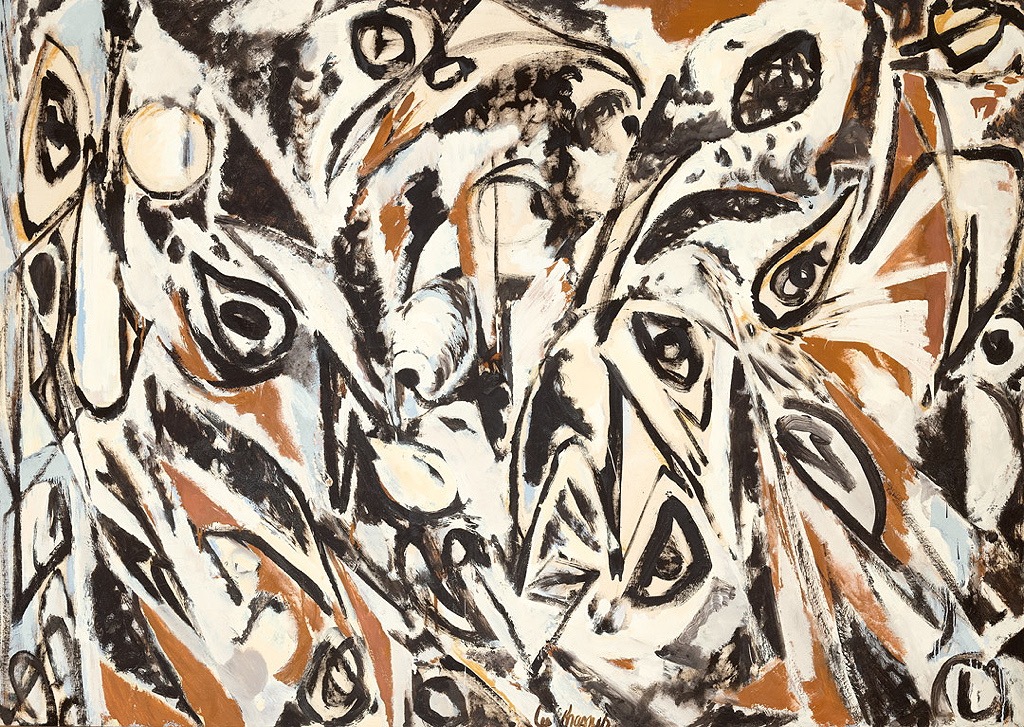
Lee Krasner: NIGHT WATCH (1960)
"Life's open-ended."
Overall, I'd testify that taking stuff apart tends to be much more satisfying than putting stuff BackTogetherAgain. Tearing down satisfies the little boy in me since it hints at destruction. I guess a part of every little boy secretly wants to be The Incredible Hulk and trash the place without recrimination or remorse. Reassembling can be exacting and challenge even the very patient since it holds out the promise of perfection or something like it. It seems too easy to presume an outcome unlikely to be achieved then blame myself for falling short. Taking apart's successful when entropy peaks. BackTogetherAgain might never be achievable.
I say that BackTogetherAgain "might never be achievable" when I know for certain that it's almost always absolutely unachievable, and at all other times, only relatively so.
Schlepping
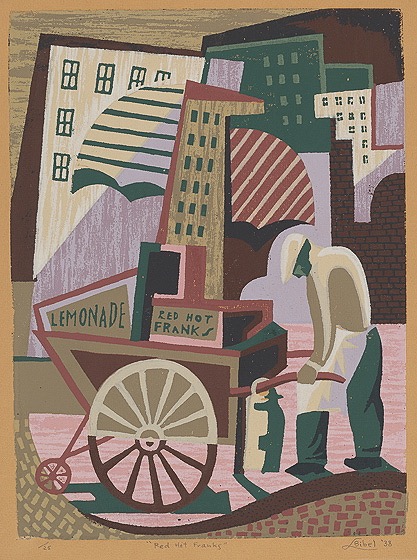
Leon Bibel: Red Hot Franks (1938)
"I sound like a steam locomotive coming."
My hand truck must be the most useful tool I own. I bought it back when I often found myself Schlepping shipping boxes to the post office in preparation for another workshop but I've found uses for it far beyond Schlepping shipping boxes. I use it in the yard, for instance, instead of a wheelbarrow. This move that might never end has daily benefitted from my hand truck's presence, for This Grand Refurbishment might just as easily be called The Grand Schlep, since we seem to have moved everything we own several times since it started and we have not yet seen the end of it. With my hand truck, though, I don't have to lift much to tote a lot, something my back sincerely appreciates. Just yesterday, I moved all my books again, for something like the fourth time since we "moved in" last March. I'll move them at least once more before I'm finally ably to unbox and display them, each move made easier by my ever-present hand truck.
Everything's a Schlep.
Proficiency

Judith Leyster: Self-portrait (c. 1630)
" Whatever we do, there we are."
Grand Refurbishments serve as test beds, breeding grounds for new skills. One begins a Refurbish with hopeful optimism and little knowledge of what might be required to complete the effort. One might, upon later reflection, recognize that the work couldn't help but challenge. It could not have possibly been a walk-through exercise. It would prove to be a crawl-through sometimes. Perhaps such experiences build character. I know from my own experience that in a typical year, I might gain a single fresh proficiency. In this Grand Refurbishment year, I've acquired several. This cluster has provided me with a rare opportunity to more closely observe how I learn and how I adopt lessons to become proficient.
I'm learning that it might be best for me if I can presume that I don't really know very much of anything.
Stalled
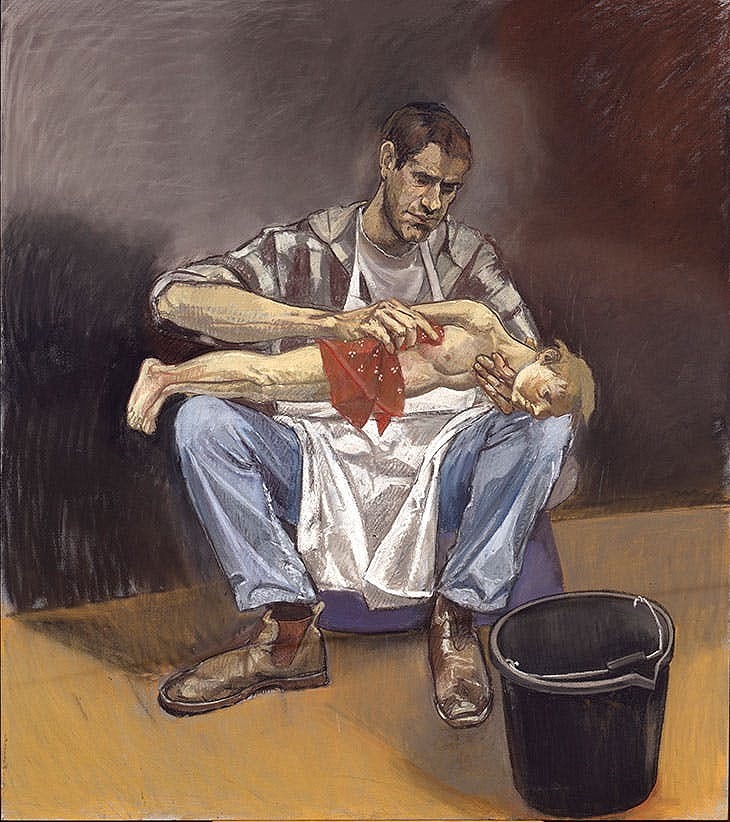
Paula Rego: Geppetto Washing Pinocchio (1996)
"It will be a wonder if we're ever finished."
We tend to insure against big events, even though small occurrences seem to be the more likely to do us in. Through this Grand Refurbish, I've kept my eye on our paint inventory, understanding that availability could stall our forward progress. If anything, I've over-bought paint, figuring that I could always use any extra. Just yesterday, while recounting what I imagined to be our inventory of ceiling paint, I caught myself over-estimating remaining stocks. I immediately called the paint store and ordered two more gallons. Better to have too much than to discover that we have none when we need it. The whole affair seems in delicate and unlikely balance. We never sat down and imagined together what might be coming. We adopted instead the hunter/gatherer's ethic, which more resembles the old and often surprisingly reliable hunt and peck method. We've successfully poked at progress so far.
But small things have been our bane, or at least mine.
Flurry
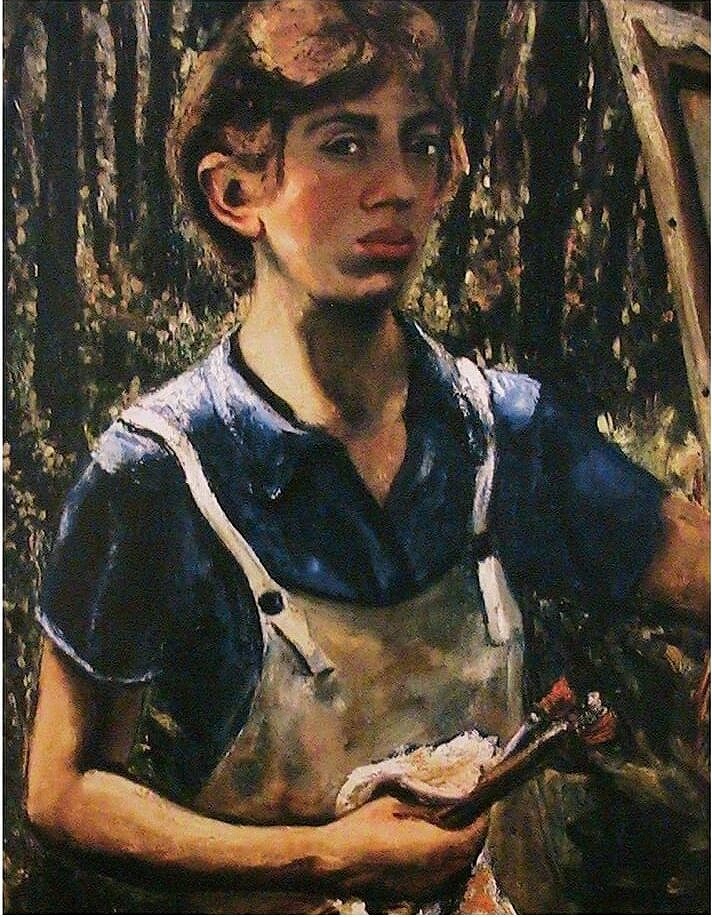
Lee Krasner: Self-Portrait, ca. 1928
"Flurries produce closure …"
This last week in October falls in a Flurry time. When we lived along Colorado's Front Range, we'd reliably see snow flurries this week. Down here in this lovely valley, flurries of leaves visit long before snow. This year of The Great Refurbish, the Flurry comes with an impending end to the effort, and it seems true with all effort, that the final push tends to become hectic. We've become lemmings now, not precisely anxious to make that final leap, but somehow compelled to jump en mass. Tiny tails remain from many of the individual tasks and these, alone, would naturally distill into a clog of activity. I've been struggling for a week to mount the first of a dozen lock sets on refurbished doors, a task I'd earlier presumed would naturally prove trivial. In practice it became non-trivial and necessitated a whole new thread, disrupting flow as I'd earlier imagined it. Window locks, which were on back order when I submitted the order three months ago, remain undelivered. Installing them will doubtless become a Flurry once they arrive and they will most certainly arrive at an inconvenient time, a point where my time's already spoken for and I cannot fit another blessed thing into my schedule. These remain perfectly normal aspects of an impending ending, an inevitable swirl, a Flurry.
We wisely planned on proceeding through this refurbish at if not a leisurely pace, then at least at a reasonable one. ,
StabWounds

The Wound Man from Hans von Gersdorff's Feldbuch der Wundarznei (1530)
"We were walking wounded when we began this effort."
I had finally decided that I had studied enough. I had either learned what I needed to understand to mount the new door lockset or I had not, but I would never confirm whether I had or hadn't without trying to mount it. I was deepening the edge plate's inset when the chisel slipped and found my finger, producing a clean stab wound that bled profusely. Two things can be done profusely, I figure, cursing and bleeding. I rushed as best I could through the buzzing Refurbishment activity to the main floor bathroom where I had presciently packed in a supply of bandages. The Muse, up from her basement Zoom Lair for a bite of lunch, offered to help me stick on the bandage. I decided that I needed a lunch break then, too, so I moped around feeling stupid for a half hour before resuming my interrupted attempt at mounting that new lockset. Nothing I'd found in my search for examples of how to accomplish this task had prepared me for StabWounds. I had let down my guard and gone without gloves, a sure sign of my inexperience. I was learning, though, as evidenced by the fresh bandage on one of my two and a half typing fingers. I'm finding it difficult to type this story as a result.
I always was a noisy learner.
Novitiate

Giuseppe Arcimboldo: Vertumnus (1591)
"The house remains in charge. I, it's vassal."
When my to-become first wife and I were living together on the unheated sleeping porch of her shared apartment on 19th in Seattle's U District, a pane in one of the windows which comprised most of three walls of her room somehow broke. I don't remember the circumstances under which the damage occurred and that detail's probably not important. I took it upon myself to fix the damage, me an eighteen year old with absolutely no experience fixing broken window panes and no tools. I would not have even qualified as an apprentice, but someone of slightly less position on the grand hierarchy pecking order. I was a Novitiate, one interested in dedicating myself to successfully fulfilling the assignment but without sufficient understanding to even begin understanding what that effort might entail. I also lacked even an apprentice's supervision. I had yet to discover if I had the necessary stuff for even becoming an apprentice, which requires a certain attentive interest along with an acquiescing spirit. Headstrong novitiates need not apply, neither should haughty apprentices. I was merely aspiring to become capable of completing that self-assigned commitment and didn't even know that.
I'd watched my dad fix broken window panes, including one I'd created with one over-heavy Thursday morning Oregonian through one of my customer's windows.
Production

François Boucher: The Triumph of Venus (1740)
"The value we actually bring is always a solo contribution …"
In the very late sixties, I was fortunate to attend Donovan's Seattle performance of his Gift From A Flower To A Garden Tour. Set in the voluminous, boxy Seattle Center Arena, the venue was better suited for basketball than for a folk concert, but there I was, sitting up near the nosebleed section almost as far as I could have possibly been from the stage, waiting for my favorite recording artist to take the surprisingly sparse set. It was decorated with a very large pillow and a microphone boom surrounded by fresh flowers. Nothing else. In an age now where even individual performers travel with a fleet of semis carrying their stage set, such an arrangement seems unthinkable. Now, a proper performance stage seems to require huge video screens and probably parabolic projection equipment to show movies on the ground fog produced by silently whispering machines just off stage. Further, risers must also be provided to elevate the drum sections and the horns, not to mention the space for the piano, bass, and multiple accompanying guitar players. No, the simple pillow surrounded by cut flowers just would not do today.
That was the best danged concert!
HomeBitterHome
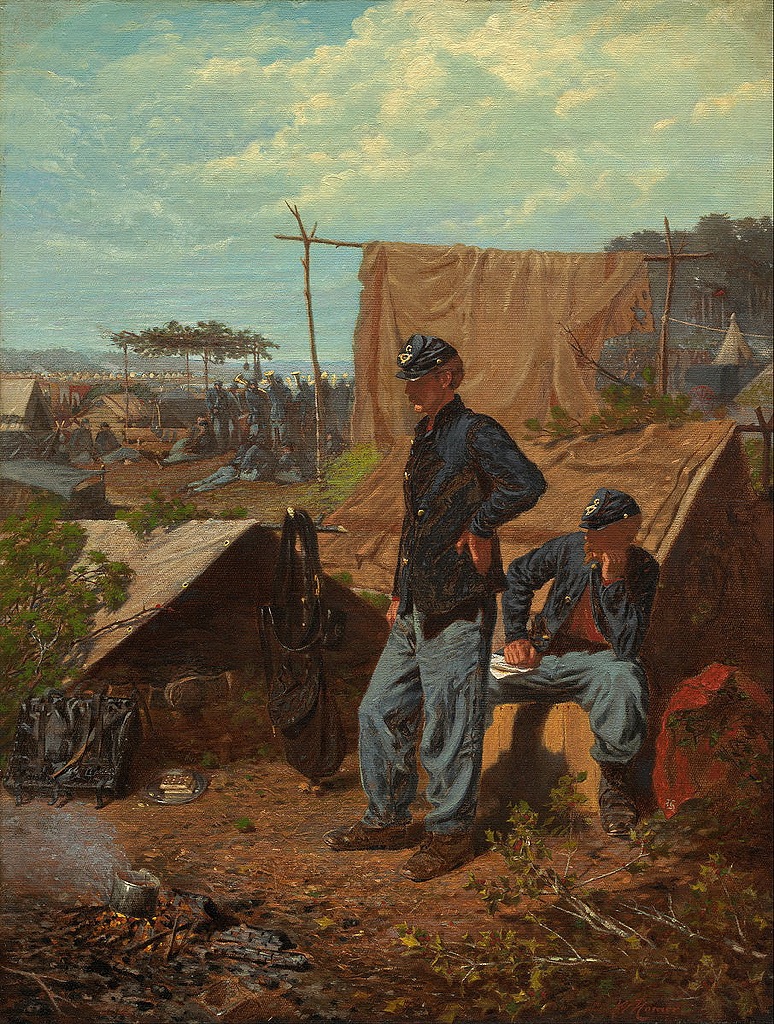
Winslow Homer: Home, Sweet Home (1863)
" … I didn't think I could survive the flush of emotions involved."
My son sent me an Air B&B link to a place for rent in our old Portland neighborhood. It took me a minute or more to realize that this was our old home place, the home in which my son spent his first formative years, the one secured with my own blood, sweat, and tears, hopes and dreams, struggles and deep disappointments. Homes become the backdrop for life's dramas, where the intricate effort rarely seen and even more rarely disclosed occurs. It is the place of private fears and even more private tears, of humbling embarrassment and occasional pride. It's what you settled for and what you earned and what you couldn't quite afford all in one. It's a wonder to me that anyone, especially me, even has a home, for the rules for owning a home have always been murky, and I suspect murky for good reasons. Should anyone ever get to the bottom of the pyramid scheme, they'd very likely find that there's no foundation underneath. Imagining supports it. Home is a fiction capable of fooling almost anyone into believing it exists, especially with people like Stephen Foster writing sentimental songs about it. "Be it ever so humble … There's no place like home." Truer words might have never been spoken or more widely misinterpreted.
Needless to say, that link transported me to those years when I struggled to provide a home.
SacredContext

Titian: The Death of Actaeon (1559-75)
"It exists to change us"
Mythology tells the sorry story of the hunter Actaeon, who besides having the misfortune of possessing a name with an imbedded digraph, once stumbled upon Diana and her nymphs bathing in the forest. Diana dealt rather harshly with Actaeon's blunder, however innocent, turning him into a stag which his own dogs then hunted down and killed. I sometimes get confused about the moral this allegory intends to impart. Does it caution about blundering into nymphs or something else? I choose to interpret it as referring to what I'll call SacredContext. Every blessed and damned thing possesses SacredContext, for it is the very nature, the subtle essence, of each thing. It appears in different guise depending upon the underlying nature of each thing, and cannot be adequately anticipated. It must be discovered, often blundered into, and when violated, responds in heartlessly harsh ways. To violate a SacredContext is to violate the universe and the universe seems to possess no leniency or sense of humor where such violations exist.
I believe, if only to reassure myself, that most violations of SacredContext occur innocently, like poor Actaeon's must have.
Bivouac
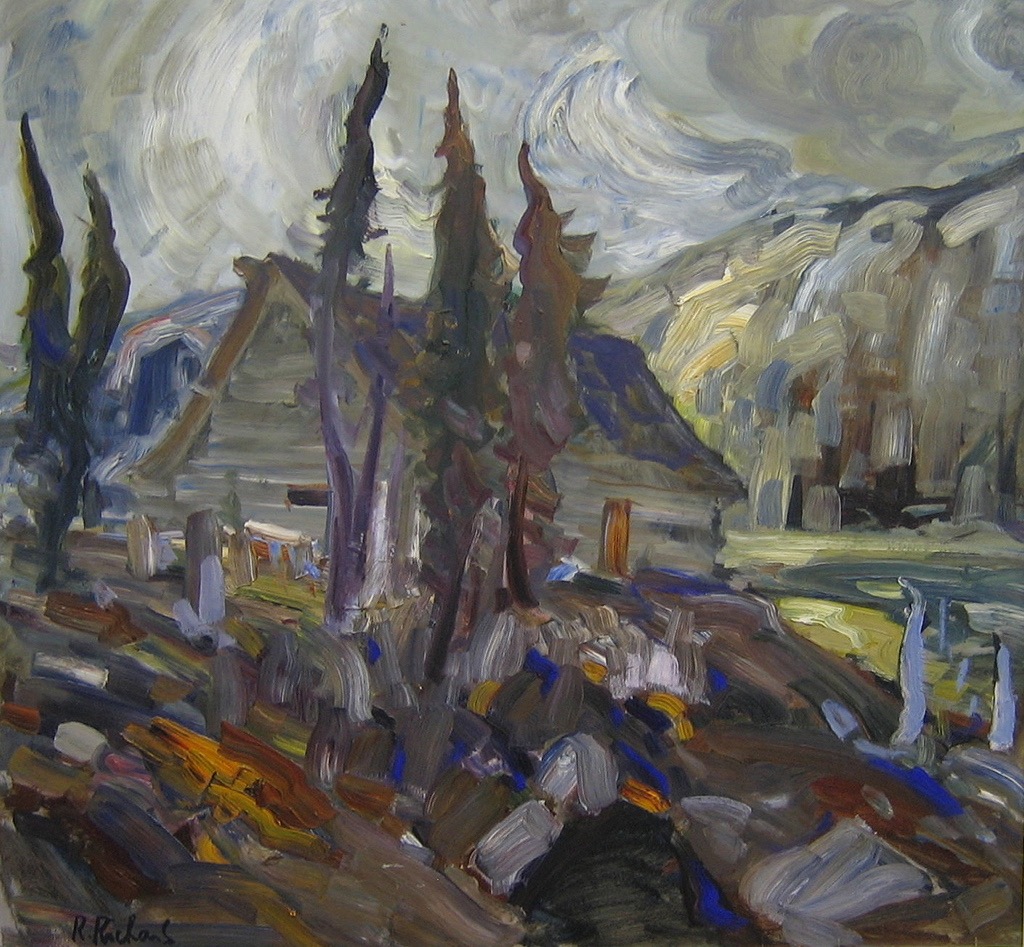
René Richard: Bivouac (date unknown)
"I've probably survived worse before."
The Great Refurbishment turned what might have been our home into a Bivouac, more of an encampment than a dwelling, a transitional place. We're still not hardly moved in after seven long months of pseudo-habitation with boxes being our primary companion. I long ago stopped wondering where my possessions were, trading in a level of frustration for a ration of faith that they're there somewhere and that we'll one day—not today and probably not tomorrow, but someday—be reunited. Until then, I've taken to living with the subset of my possessions that I have thus far uncovered and stopped fretting about the others. They belong to the great mystery, a constant companion but nothing really worth fussing after. The Muse and I are, in the mean time (which some days seems heartlessly mean) "making do." I would not wish our transitional lifestyle upon anyone. It's brutal.
I'm from a family that had to put everything in order before we could leave for longer than a day.
Thises&Thatsesses
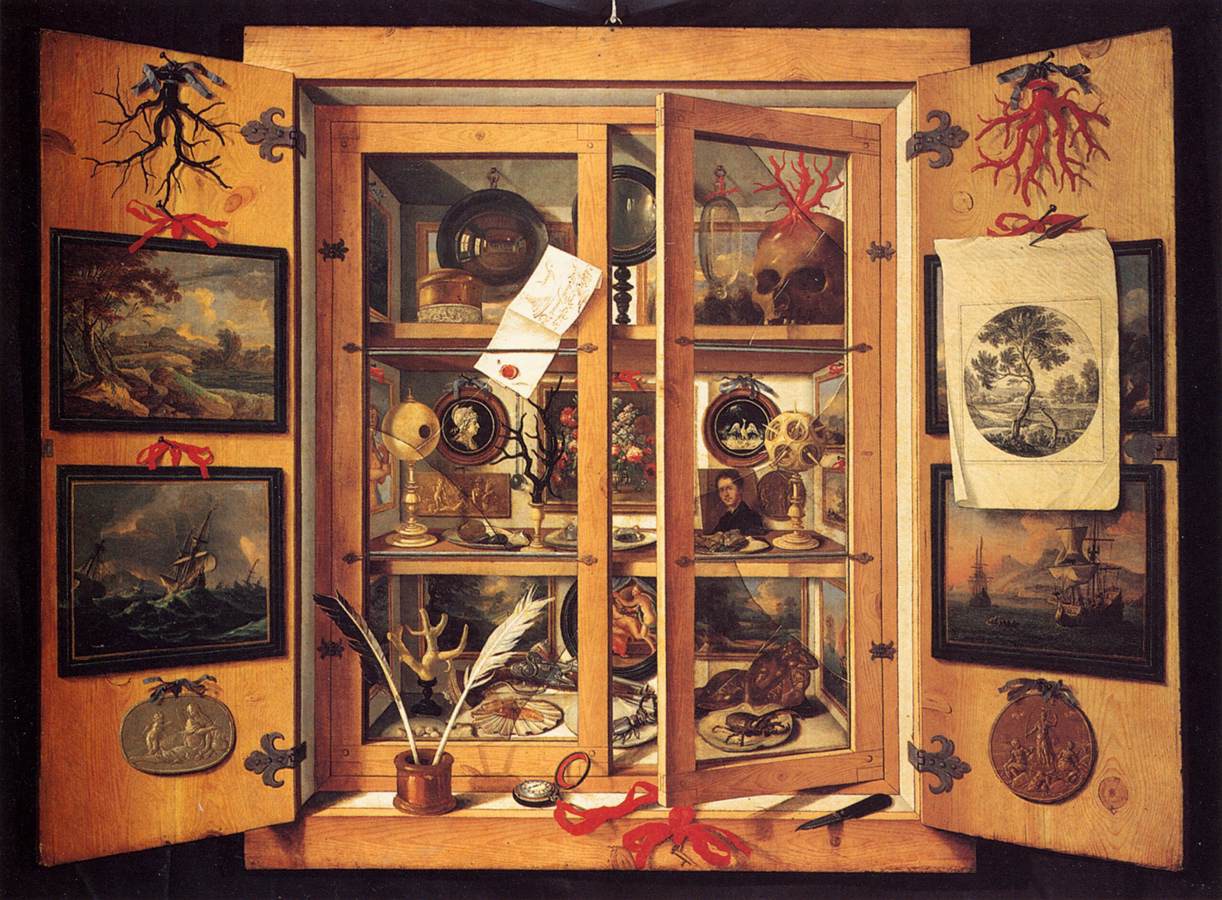
Domenico Remps: Cabinet of Curiosities (1690s)
"I should very soon move back to my desk
and stop writing while hunched over this piano bench like I have been for the last few weeks."
For most of The Grand Refurbish, we focused upon single activities. We were either engaged in this or that, but after fifteen full weeks of effort, we've pretty much concluded the big stuff. Kurt Our Painter continues to motor through rooms, now in well-practiced order. He no longer need enter first with an act of discovery. He's learned what to expect and he's not lacking in necessary judgement. One crack's pretty much like every other. He enters and sets to work, fixing cracks and prepping windows and trim while his fillings set. He tapes himself off for a day to run his sander before laying down the same sequence of finishes: primer, first coat, then TopCoat. The closet gets the economy service because nobody ever needs a finely finished closet. The rest of the room he works to immaculate. Then on to the next.
The Planking finished, the leftovers either stored in the basement or carted off as trash.
Transitioning
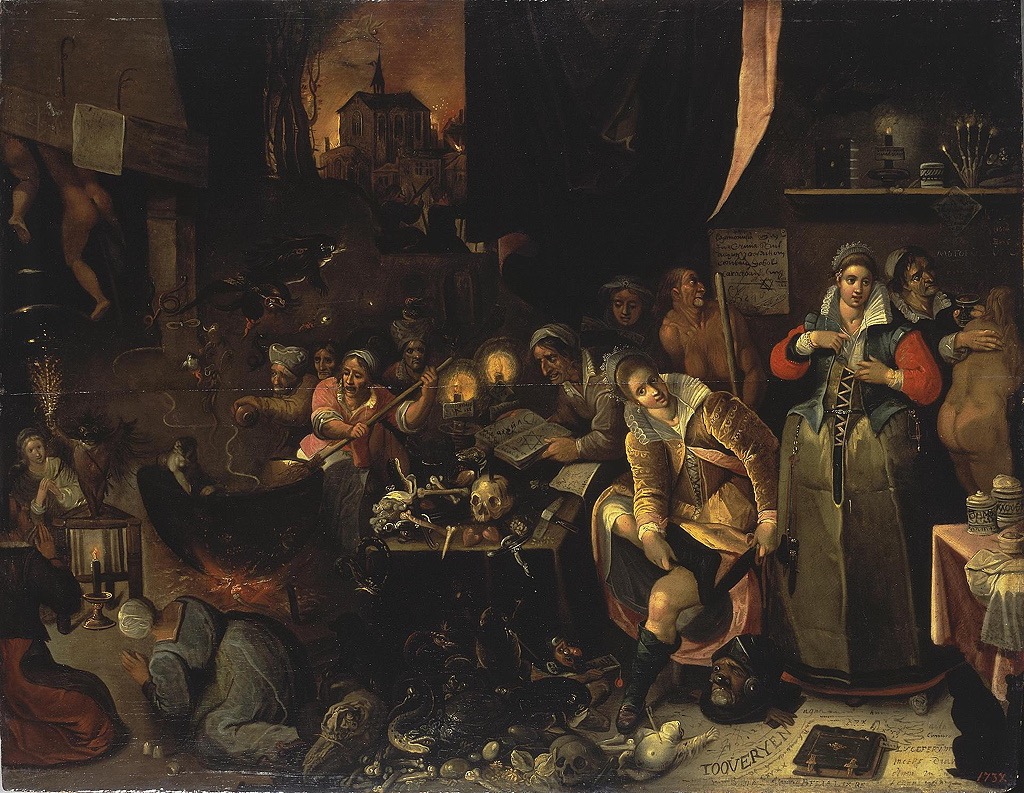
Frans Francken The Younger: The Witches' Kitchen (1606)
" … Transitioning back into the more significant but more humbling role of human again."
With The Hunter's Moon came a breath of a Pacific storm, a contradiction in terms no less welcome for its identity confusion. The leading edge of the storm brought down the maple's helicopters to litter the property and leave me with gardening as my growing priority. I'd been absent, absent in that way that only focused presence can ever produce. The Grand Refurbish had nudged most of the rest of my life to the edge of the path and left me missing dimensions. My single focus had rendered me blind to much of my usual oversight. I'd become erratic and careless and filled with the very most effective excuses. My limited time was pre-focused upon the primary project at hand. I'd become a narrow and uninteresting man, always bringing every conversation back to some arcane appreciation for some previously unacknowledged aspect of door refinishing or something equally captivating.
I realized as I moped around the place yesterday that I might be Transitioning out of that laser-focused phase, one which always so satisfyingly takes away the mind for a time.
Leavings
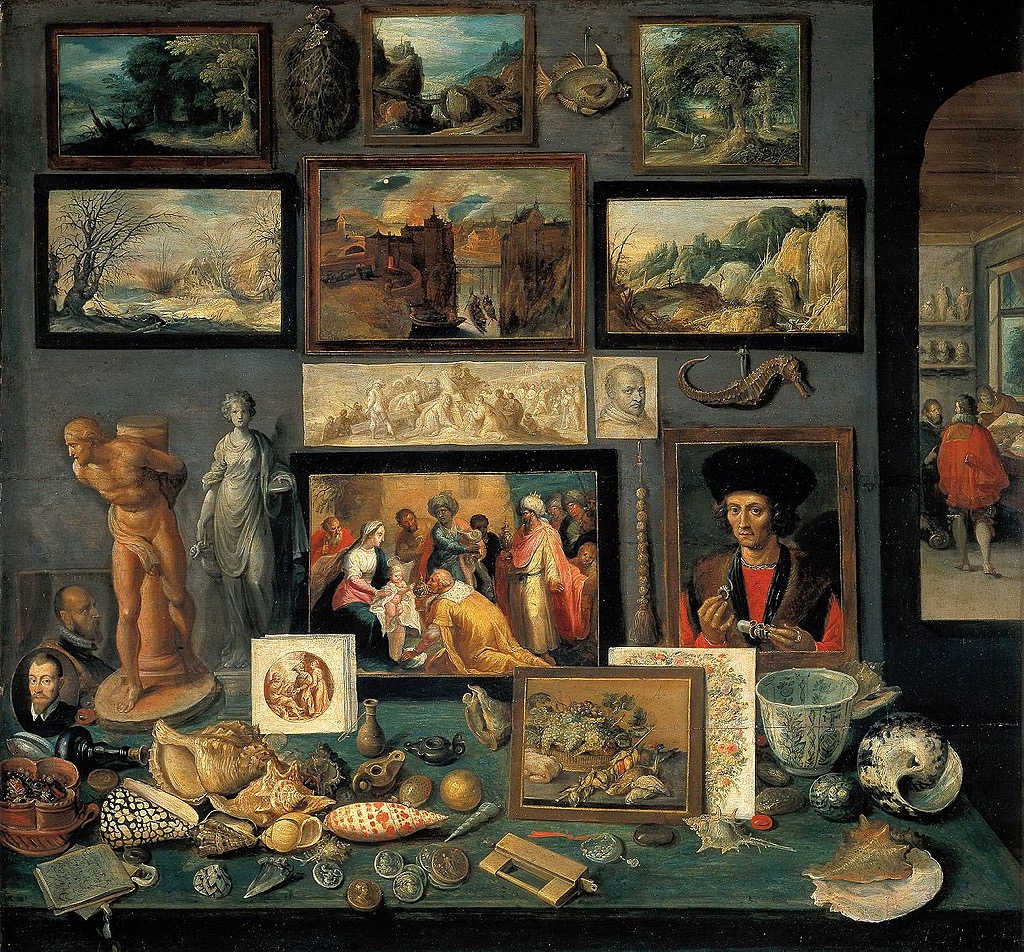
Frans Francken the Younger, Chamber of Art and Curiosities (1636)
"Every human activity produces leftovers …"
Every human activity produces Leavings, leftovers. We installed a new screen door and ended up with a few parts leftover, not because we didn't follow the installation directions, but because we did. The door as delivered was capable of being installed in several different ways depending upon specific conditions. Almost everything's like that now, which means that installing anything will surely increase at least the net inventory of odd bolts or screws, and probably leave a single use, tin whistle piece of metal I won't be able to justify discarding, so I'll retain it Just In Case. Of course I have a storage problem in my basement, just like everyone else does. I've retained so very many Leavings that I cannot for the life of me remember what I have retained. I also can never find an odd screw or bolt when I need one, though I imagine that I certainly must have at least one of every kind known to man. If I do, I cannot find where I set them aside.
Years ago, a friend gave me a dozen old wooden Coca-Cola cases which I set along the wall edge of my massive workbench to produce an instant warren of little cubby holes, a genuine Curiosity Cabinet useful, I thought, for holding my Leavings, and it has been useful, though with 144 little cubbies, there are far too many for me to remember what and where.
GrowningUp

Herkules nimmt Atlas die Last ab und trägt den Kosmos
[Hercules relieves atlas of the burden and carries the cosmos]
In the style of Heinrich Aldegrever (1550)
"The time spent completing the task lost forever. The result, eternal …"
I looked at the final batch of baseboards, which I had uncomfortably stacked inside the garage, and I felt overwhelmed. Most of the remaining boards were long: ten, twelve, even fourteen feet, and though I'd already sanded them smooth and glued the ones that had shattered when we removed them, I could not quite face touching them again. Painting would insist that I touch each several more times, shuttling them between a painting station and drying racks, then back for each top coat. Each coat takes an hour or more for the batch and demands great focus, no breaks allowed, especially once I start applying the final TopCoat. These boards have demanded much, not the least of which has been extended detachment. I know, it might seem as though refinishing a board would be all about engagement, but it's the sort of engagement that insists upon a detachment in order to complete. One may not maintain mindfulness and manage their way through the effort. One must go at least semi-conscious if not completely unconscious or he's sunk before he's finished. One can dabble in removing baseboards, and even when mending them, but once the refinishing starts, expect long hours of demanding toil. Sanding each bare might take an hour per, or more, not to mention sweeping off the sanding dust and washing them then stacking them away out of the weather again, then unstacking and sorting and painting, I never felt completely up to any of it. I just did it anyway because I'm the grown up, GroaningUp to it's more like it.
My father taught me not to whine about my assignments but to buckle down and just complete them.
Shortages

Rembrandt: Jeremiah Lamenting the Destruction of Jerusalem (1630)
"Freedom might first seem like the liberty to purchase …"
I stopped in the paint store last week and found some shelves holding cans of what I might have easily mistaken for paint. I asked Luis at the counter what was going on because it almost looked as if he had some product to sell. He replied that some product had apparently accidentally trickled in, though nothing in volume. I've been fortunate through our Grand Refurbishment, since I've not had to shut down progress due to an inability to procure paint. I have had to buy better grades of paint than I might have otherwise purchased, and I have had to wait an odd day or two for an order to come through, but progress has not been stalled due to a lack of supply. My neighbor's son owns a painting company and he's had thousands of dollars worth of paint on backorder through the entirety of this year's painting season, a devastating situation with no end in sight. What we once imagined as our birthright, unlimited supplies of goods provided by a benevolent market, has now become the exception as that same market struggles to keep up with demand.
I almost expect our local newspaper to start a Shortage Of The Week column except it would probably only encourage panic buying by exploding demand for whatever it reported.
TopCoat

Dorothea Tanning: Philosophie en plein air [Fresh-air Philosophy] (1969)
" … become essentially invisible while standing there in plain sight."
The rules seem clear enough, but impossible to follow. If I had infinite inside space, I might be able to lay down a perfect TopCoat, but I don't. I have baseboards balanced atop everything in the Pop-up Paint Shoppe, garbage cans, empty cat litter tubs, the table, even saw horses. It took an hour or longer to lay the prime coat on, a little less for the first TopCoat. The second, and typically the last TopCoat, should take a little longer because it gets the most meticulous preparation. It's the absolutely last chance to amend the record posterity will record. There will be some sanding and filling involved. What passed muster after priming and didn't quite cause a fluster after the first TopCoat, will find my puritan heart and demand reform before heading on. My sanding block will find some work. So will my putty knife.
Painting forces a painter into numerous poses, for there's just no applying paint while standing straight upright.
KidWork
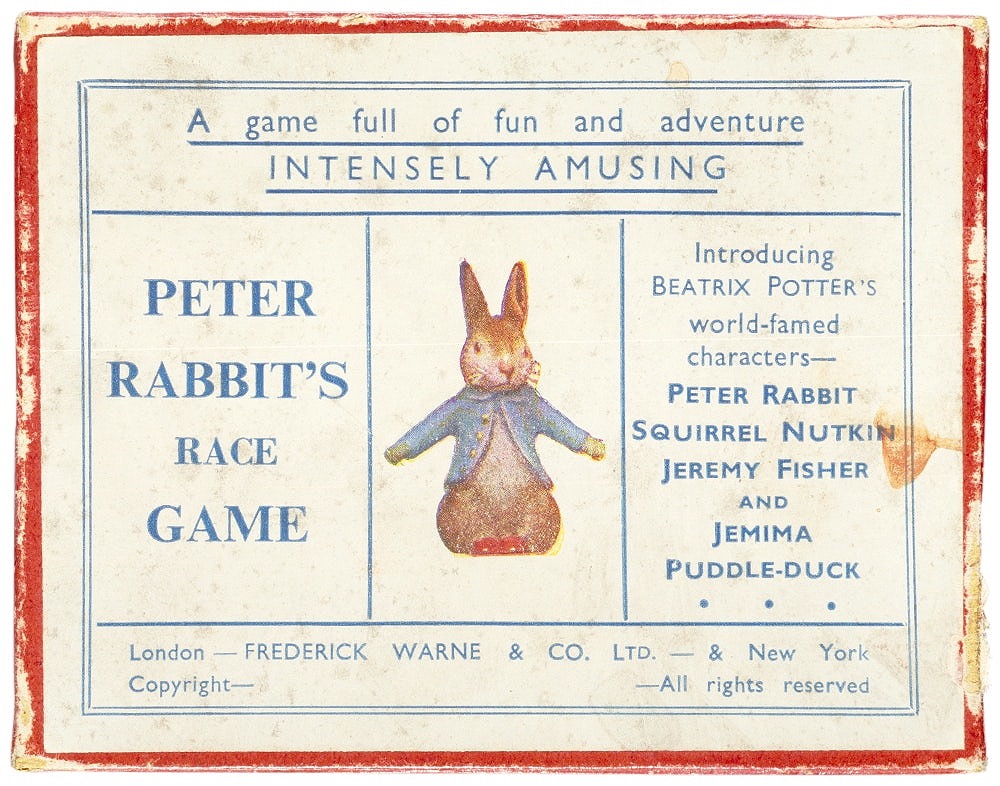
Peter Rabbit's Race Game' showing the top of the lid, made by Frederick Warne & Co Ltd. (c.1930)
"If it's not fun, why bother?"
While most of our Refurbishing work requires an adult's patience and skill, some of the effort qualifies as KidWork, if only because the workers remain, as do all adults, kids at heart. We look for opportunities to break out of our roles and escape from under our responsibilities, if only for a few spare, necessary minutes. Almost anything out of the ordinary qualifies as KidWork, a trip to pick up a needed quart of paint could do. It's mostly about attitude. KidWork offers opportunities to play, to recreate, without even a hint of a suggestion that one's shirking off. It's largely a matter of style, a playful guile, often applied to what might otherwise seem like a serious undertaking. I find that emptying the garbage, if entered into with the proper flippant attitude, can provide that slight change of pace that almost feels like a vacation from more serious and consequential tasks. I might choose to exit via the scaffolding, remembering long hours spent hanging from monkey bars in my youth. Five short minutes of clamoring down or up, and I feel like a pup again, ready for anything.
We quite accidentally discovered how satisfying throwing stuff off the front porch roof deck feels.
Milage
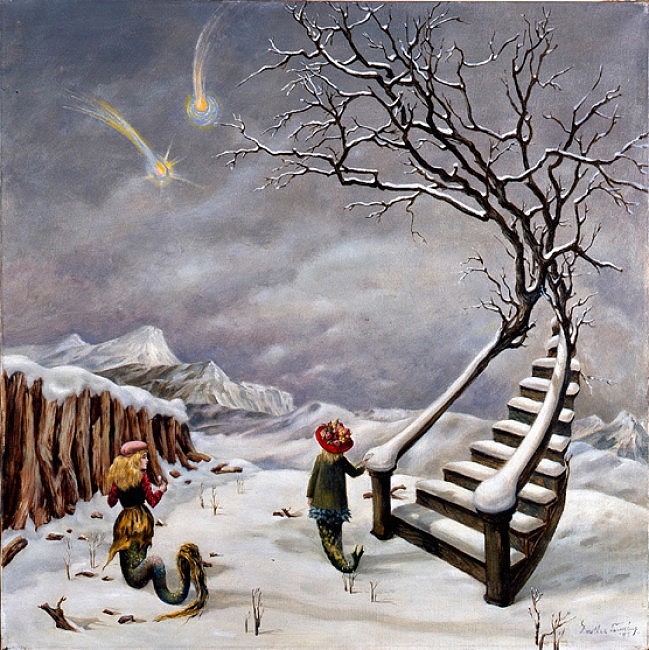
Dorothea Tanning: The Truth About Comets (1945)
"That last millionth of an inch makes all of the difference …"
A difficulty arises when considering how to measure progress of a refurbishment, which might reasonably involve many simultaneous activities. How might one measure doneness? Horizontally comes to mind for those of us poisoned by formal training and practical experience managing projects, but viewing refurbishments, like, indeed, viewing most projects as horizontal series of activities seems sort of like artificially propping up a body so that it looks more life-like. Refurbishments live mysterious lives and seem downright discontinuous in practice, with tasks started and stalled for tenuously unpredictable reasons. There is literally no predefinable path to conclusion, so any suggestion that one knows, for instance, how much effort remains at any point in time embraces an illusion, a better portrait of the projector's presumptions than anything really likely to happen. Progress might be better measured in the tiniest measurement available, one difficult to imagine, in Mils and Microns, and along a vertical axis, in depths.
You see, the most dramatic effect any refurbishment produces likely results from painting.
Cahnge
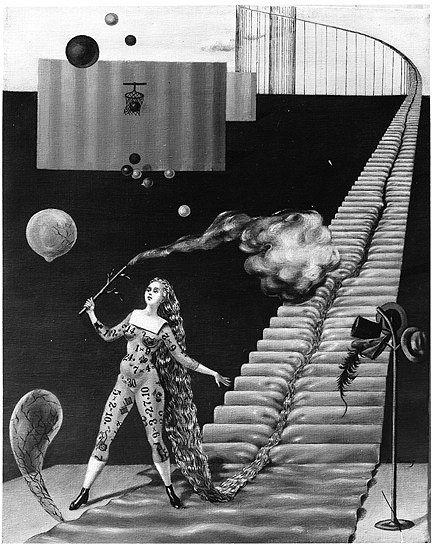
Dorothea Tanning: Concerning Wishes (1942)
"Maybe we can achieve that change with balance."
I signed on to work with a boutique consulting firm in Silicon Valley but I refused to move there. I commuted from Portland, an hour and a half flight, which left me with a shorter commute than some of my partners who lived there. The firm, like all firms must, sported a mysterious name, a made-up Sanskrit word which we claimed meant "Moving to the next level with balance." I didn't know this fictional part at first but learned it from a native Sanskrit speaker who attended one of our workshops. We were in the change business, and business boomed for us for a while, for everyone in Silicon Valley's in the change business and every firm seemed to be seeking some way to move to the next level with balance. Of course the concept was fatally flawed since moving to any new level remains an inherently unbalancing experience and nobody ever pulls off balanced transformation. It's inevitably different on the other side, and different in unanticipated ways. It properly takes a while to get used to any significant new status quo. Believing otherwise doesn't help anything, but makes things worse.
I know for myself that whatever I'm chasing will certainly turn out differently than expected.
Compleadings
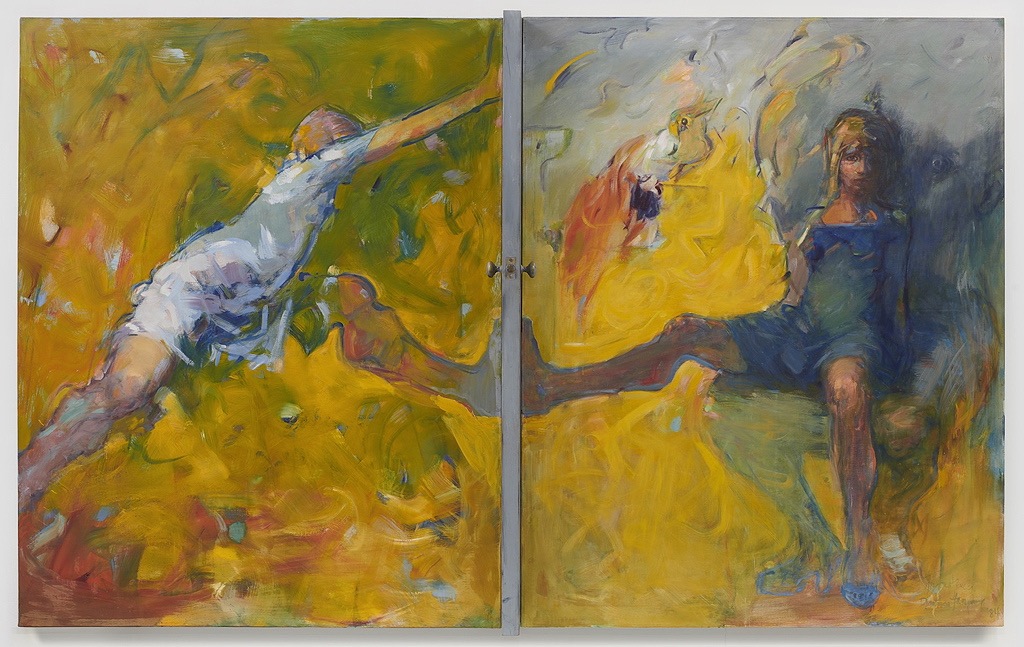
Dorothea Tanning: Door 84 (1984) (oil on canvas with found door)
"I want to remain a permanent work in progress …"
Twelve weeks into our Grand Refurbishing and one might think that I'm aching for completion. After all, it's so far been three month of fine dust and irresolution. Wouldn't a spot of done do wonders right about now? My honest answer to that question would have to be a steadfast, "No!" I'm not feeling ready to let go of this pursuit, even if the original pursuit has caught up to original intentions. We're still a little shy of crossing the done, done, and done finish line, but intimations have been swarming, threatening our little operation. While the titular purpose of all this fuss and all those feathers was certainly a refurbished Villa, as always happens, a superior purpose appeared while we were on our way to finishing. A manner of living emerged, one submerged in personal aspiration and mystery, striving, disappointment, as well as genuine accomplishment. For a time here, we felt as though we could accomplish anything we set our minds to accomplishing and we daily set ourselves to experiencing that most marvelous process. We've largely succeeded, which propels me into a dance I've experienced many, many, many times before. Let's say that I'm Compleading rather than simply completing. I'm feeling like I don't want to let go of this adventure yet. Closure seems like a form of death more than a sign of success.
It was the same for me when I attended university.
Imp-Erfection

Pablo Picasso: Femme dans un fauteuil (Dora Maar) (1942)
" … which might have been the purpose of our pursuing all along."
Whatever I order at the butcher shop, the young woman behind the counter responds by saying, "Perfect!," in a genuinely delighted tone. I know and I suspect that she knows, too, that there's really nothing perfect about my asking for a beef cheek or a couple of duck legs, but I haven't called her on her characterization yet. I figure she's fallen in with a bad linguistic crowd and can't really help herself, like those who feel compelled to end their every sentence as if they were asking a question rather than making a statement? Some language usages seem more afflictions than conventions, and they tend to infect some generations, not others, bringing us older folks to wonder whether evolution produces better or just glaringly different. The now widespread adoption of the Perfect! response seems unlikely to improve anyone's chances for long term survival.
The longer I live, the less I feel attracted to perfection.
Inadvertencies
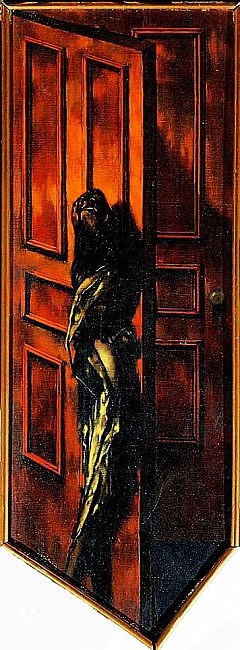
Dorothea Tanning: Lumiere du Foyer (The Light of the Fireplace), 1952
"I do not have a process by which to formally disagree with their assertion …"
I have wrestled with 'process people' all my professional life, for professions tend to be dependent upon defined processes. Definite procedures exist for practicing dentistry and accountancy, and making it up as you go along is strictly forbidden if one intends to serve as an airplane pilot or a brain surgeon, but my profession belonged to that class of activities largely dependent upon Inadvertencies. To manage a project is in many ways to be managed BY that project. While many insist that there exists a right and proper procedure for managing projects, actual evidence strongly suggests otherwise. Still, I felt challenged to define what I did, to teach others how to do it, and to pretend that this profession wasn't different. I'd usually wait until the hiring executive had left the room to level with my students and collude with them to do what we could to prevent the Change Prevention Specialists in Human Resources from glimpsing the truth, hiring executives and HR professionals being notoriously thin-skinned when defending the existence of processes. It had always seemed to me that my work was better suited for birds of the field who never sowed, reaped, or stored but managed to find sustenance anyway.
I was reflecting last night, after spending the last half of my Sunday afternoon in the Pop-up Paint Shop ridding baseboards of their paint, that I had not known how to perform that operation when I'd started.
MusicalRooms
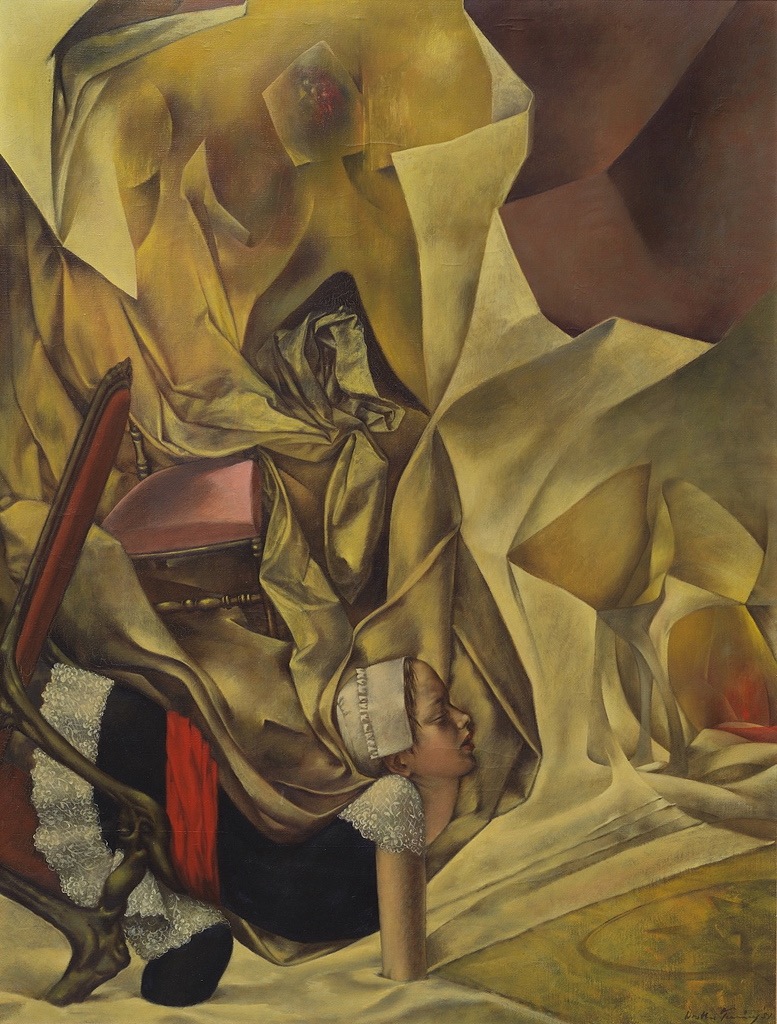
Dorothea Tanning: Musical Chairs (1951)
"I retain faith that we'll eventually find a way to finally move in."
While The Muse and I enthusiastically initiated The Grand Refurbishment, it brings certain externalities which we cannot properly characterize as anything but inconvenient. Six months after returning to The Villa for the first time all over again, we're still not moved in. We're not moved out, but also not unboxed. Our living room looks like a stage set for some post modern melodrama or undergraduate living, perhaps both. Carpets rolled up and not quite invisibly stored behind a couch suspiciously canted to provide for additional hiding space that doesn't really hide anything. Whole rooms still stacked high with boxes, most prominently, boxes of books. We live in a suspended tile puzzle, its solution not eluding us but still pending.
We've proven better at waiting and tolerating than we earlier suspected.
Debasement
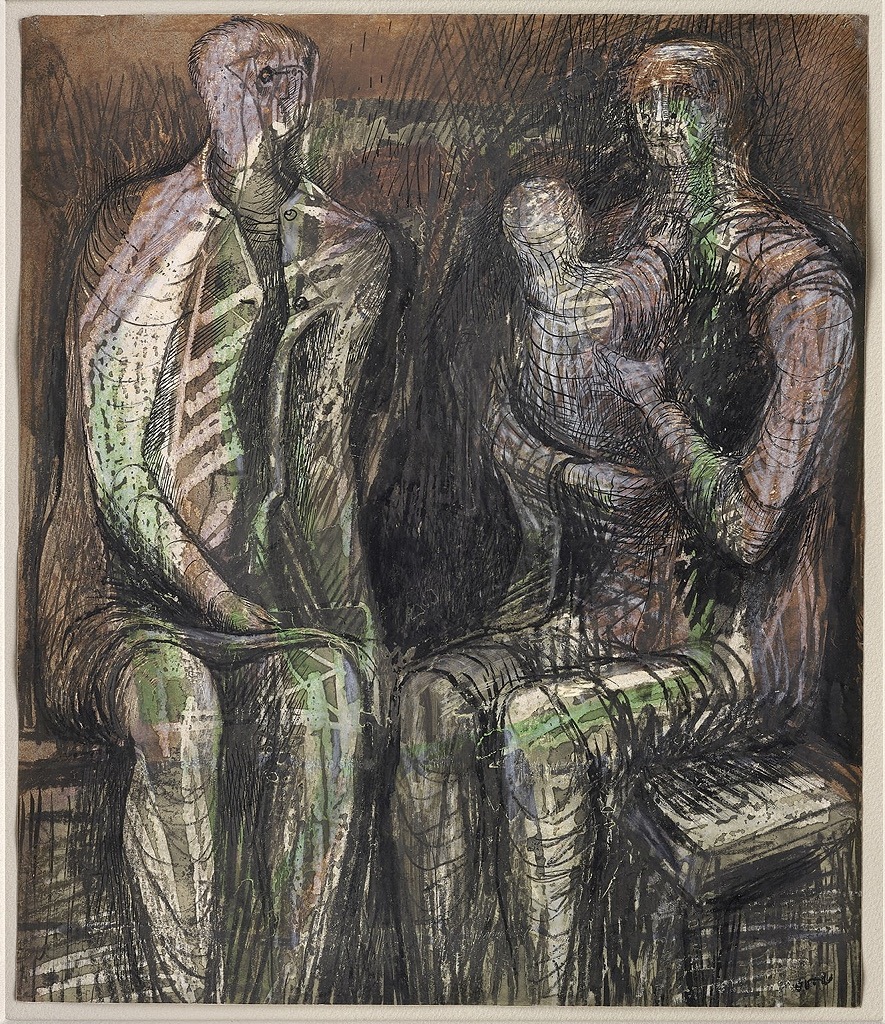
Henry Moore: SHELTERERS (c,1940-41)
"Masterpieces disappearing …"
I volunteered innocently, not knowing what I was agreeing to deliver. It was the first day of our Grand Refurbishment, the smoke hardly dispersing from the starting gun when Kurt Our Painter commented that we'd certainly need to remove the front hall baseboards to install the flooring. It would also, he insisted, be much easier to refinish that trim on saw horses than when it was nailed to the bottom of the walls. He set about separating those boards from their plaster-bound anchors. I followed along behind, pulling finishing nails two sizes to large out by their tails by means of the BIG F-ing Pliers. I explicitly agreed to take charge of those boards. I dutifully carted them out to the newly installed Pop-up Paint Shop in front of the garage and set to work refinishing them. That was the first batch.
Every room would have to lose their baseboards as part of their transformation.
LosingNews

Henri-Edmond Cross: L'air du soir (c. 1893)
" … we're all better than continuous commotion."
I was once a news junkie. I'd wake to NPR or the BBC blaring the latest headlines at me. I'd continue throughout the day, listening in whenever I found myself on the way somewhere. It was the soundtrack of my life. I rarely missed the evening summary of the day's events and felt deficient if I hadn't received the latest dispatch. It was as if I might close the difference between ignorance and well-informed by simply tuning in and being told things. I rarely watched television news, which seemed so sixties and suburban to me, not so much like reality as was the radio broadcast version. When on exile in Colorado, I grew to depend upon the ten o'clock local television news for the latest weather, which was often threatening and usually entertaining. Since we've returned here into a much smaller market, I haven't even bothered to figure out how to watch local television channels. The radio features better graphics and brighter colors. Audio books, even better.
Kurt Our Painter listens to a locally-produced hate radio station most days.
BrassMonkey

Henri-Edmond Cross: La ferme, soir (1893)
" … monkey business satisfactions."
I become different people as I engage in different kinds of work. My painter persona seems wholly different than my gardening one, and even my gardening one varies depending upon whether I'm digging or mowing, pruning or watering. Each chore demands a different uniform or at least a few different accessories. If I'm carpentering (shudder), I'll be wearing my tool belt. If I'm sanding, I'll sport ear plugs and a face mask. I'm no man of a thousand faces, but I manage at least a dozen different ones. Lately, I've by necessity taken up the temporary role of BrassMonkey on our Grand Refurbishing effort. As BrassMonkey, I've taken it upon myself to rid our venerable door hardware of a century's accumulated paint. It's a nasty bit of business involving toxic chemicals and awful smells, but I knew no other way to erase those errors.
My job was somewhat simplified by the decision that we would wholesale replace the knobs, which were mostly midcentury mediocre, cheap-looking tin.
ButtoningUp
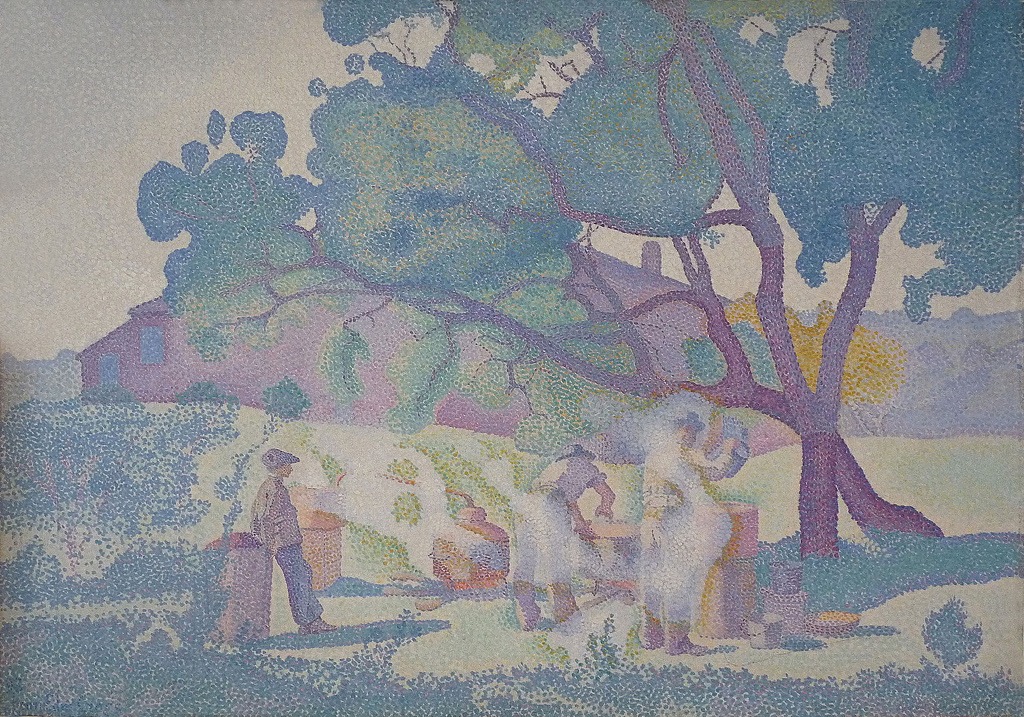
Henri-Edmond Cross: La Ferme, matin (1893)
"We'll be obeying rules now."
Throw a ball up into the air and it will fall back to Earth. In very much the same way, start a project and it will eventually turn back on itself and come to closure. Each effort encounters a point where progress no longer depends upon the initial push, but upon some force more like gravity which pulls the project to completion. Before that point, the job's all about opening fresh cans of worms and dealing with their contents. After, it's finishing touches and closing down, ButtoningUp. The project's not anywhere near over, plenty of work remains, but the nature of that work shifts. No longer exploring uncharted territory, we can reasonably foresee what's remaining. We're experienced, we've found our cadence and move to it. We're no longer poking sticks into darkness, but moving through light. We expect only modest surprises because we've already opened everything up. Now comes the closing down.
The critical component of our massive refurbishing had always been the arrival of the planking, the date of which was still very much in contention yesterday morning.
Winderz

Henri Matisse: Open Window, Collioure (1905)
"Master of my windows, maybe, finally, more master of myself."
Windows are not passive elements of any house. They live and they breath. They breathe light, carrying the essence of outside into the house, giving life to more than the houseplants, but to the other inhabitants of the place, the cats and the people. Windows also open up, sacrificing their essential selves, their role as barrier, to become a portal both into and out of. They frame changing portraits of the seasons, same old views with always different components. Windows are magical openings. They are consummate performers.
Yesterday, I prepped the windows I'd removed for reintroduction to their frames.
Ache-ers
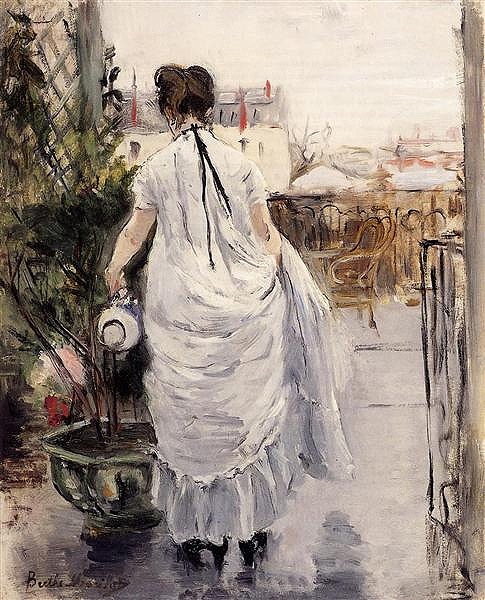
Berthe Morisot: Young Woman Watering a Shrub (1883)
"I might even adopt a hobby that doesn't leave me limping."
I move like Quasimodo in the morning and like a zombie by evening. Whatever else I have been making these past ten weeks since we started The Grand Refurbishment, I have also produced Homemade aches and pains, ache-ers. My right wrist still feels the impact of my fall two or three weeks ago in the Pop-up Paint Tent. My lower back saddle feels tight with intermittent pain radiating down to my right knee. Who knows what produced that? I some days sense that I'm just actively crippling myself engaging in all this Homework. Most days, I appreciate the stretching. I sense that I might otherwise turn stationary and still and slip back to living exclusively in my head again. My body finds it interesting and entertaining to be involved again, though each new engagement seems to leave me limping away from it.
The Muse flees to the quackopractor or massage therapist at what seems to me the hint of a drop of a hat.
DI(T)Y
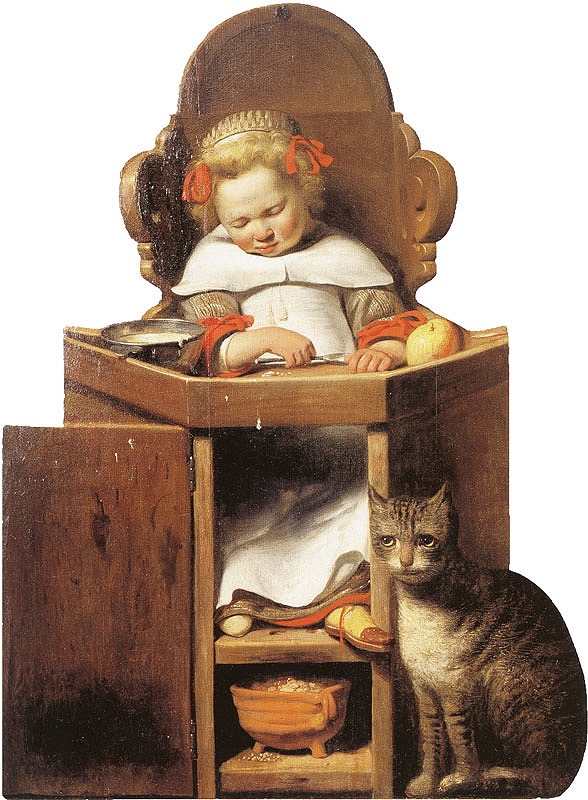
Johannes Verspronck: Boy Sleeping in a High Chair (1654)
"The ultimate DIY effort seems to be cleaning up those earlier, innocently ignorant DI(T)Y efforts."
I must maintain a certain vigilance to avoid Doing It (To) Myself whenever Doing It Myself. A fine line separates these two proximate states, and even the very best of intentions cannot guarantee that an innocent one won't become a guilty other. For me, trouble seems to start with some simple-seeming misconception. I believe I know then act upon that presumed knowledge only to later learn that I didn't know at all, for how might anyone confirm something as slippery as knowledge without some actual experience to disconfirm it? I stripped to bare wood then painted The Villa's exterior under a delusion of care which later essentially undid everything I was attempting to do. In attempting to preserve the siding by slathering linseed oil on it before painting, I ruined the paint's adhesion. The sun later heated the underlying linseed oil causing it to crack the paint. Now, I'm looking at re-stripping back to bare wood again, an enormous and necessary effort made even more onerous by the fact that I Did It (To) Myself. I produced a DI(T)Y.
We have a Homemade pandemic now thanks to tens of thousands of people dutifully Doing It (To) Themselves.
SelfDestructions

"The Americanese wall - as Congressman [John Lawson] Burnett would build it," (25 March 1916)
" … but that hope still springs eternal."
A vast part of the Homemade universe contains stuff not so much made at home as assembled there. These items arrive swathed in cardboard, often with cryptic messages imprinted on them. EZ Assembly. Assembles Itself! These come-ons invariably prove to be lies, usually damned lies. They amount to a curious kind of literary test, assessing one's ability to interpret a wholly unique literary form. Part cartoon and part text, they tend toward the disorienting and invariably assume knowledge and orientation rarely present in any homemaker, homesteader, or non-engineer. They hint at more than they declare. They've numbered pieces and prepared schematics, producing what are called exploding graphics intended to introduce the assembler to the product. They first successfully achieve in producing an overwhelming sense of disorientation. What seemed simple enough suddenly seems terribly complicated. It holds more parts and connections than anyone can successfully hold in their head at once. If the purchaser could fit the damned thing back into the box at that point, he'd return it post haste, but he cannot. Just opening the box allowed Pandora to escape along with, as will soon be revealed, three apparently essential screws which seem to have disappeared from the small, unopenable parts bag.
I call these instruction which fail to successfully instruct anyone to do anything SelfDestructions after my friend Wayne's habit of calling all instructions Destructions, as I recounted in a piece called Destructions, which I wrote over five years ago.
Buttling

David Allan: An Italian Footman (about 1780)
"We are each in service to our possessions …"
I should make it clear that I am not personally completing very much of our Grand Refurbishment. The Muse and I hired out almost all of the actual work. I've accepted minor roles as a peripheral workman, refinishing doors, windows, and baseboards, primarily to avoid distracting our actual paid workmen from their primary assignments. I'm stripping and polishing brass, for instance, work nobody would pay an experienced carpenter or professional painter to perform. I think of myself as more of the butler of the effort and Buttling as my primary focus. I'm the guy who sees that the garbage cans get emptied and fresh contractor bags are available. I run to the hardware or paint store when we're running out of something. I'm offering a cold beverage mid scorching afternoon. I'm the one remembering to thank the workers for their help at the end of each workday. I never forget that I'm not the one doing very much. I'm just filling in around the edges.
I suppose that I'm filling the role of servant leader on the endeavor.
MindReading
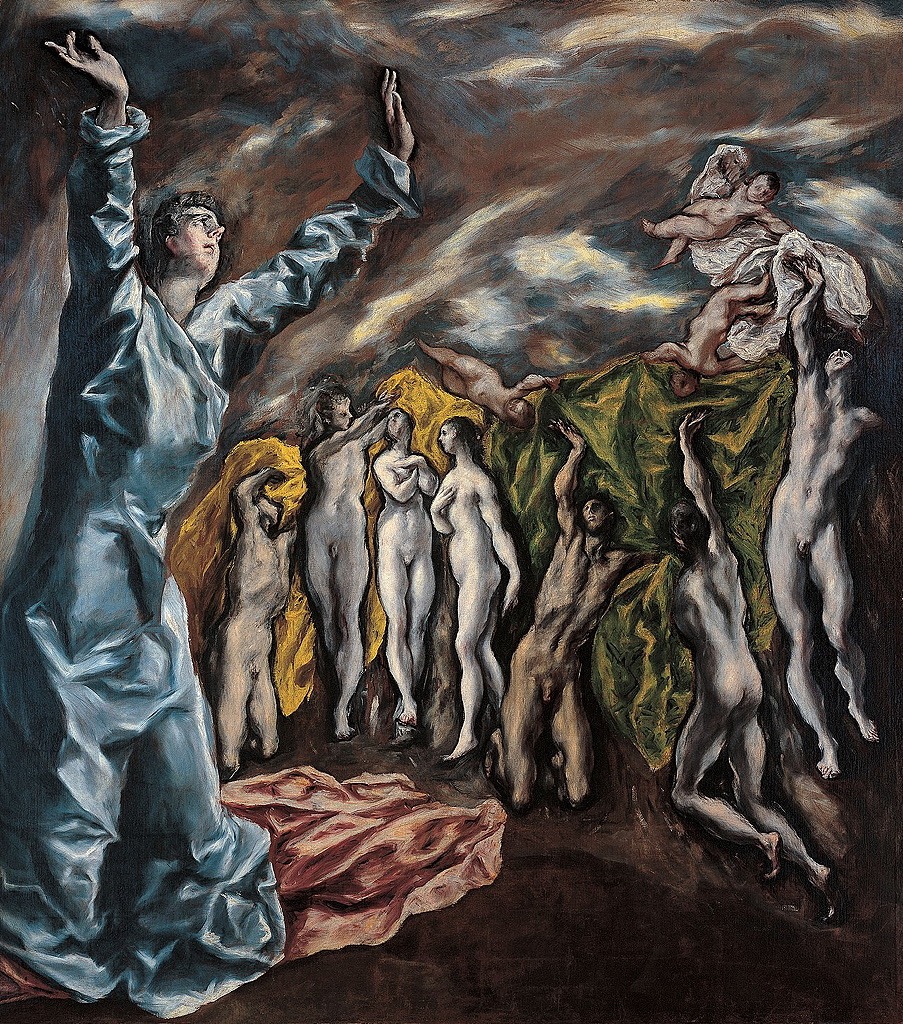
El Greco: The Opening of the Fifth Seal, The Vision of Saint John (1608–1614)
" … the source of endless unwanted entertainment."
I've learned that The Villa has eccentric windows, homemade double hungs with cords and weights dangling in the walls. They have proven themselves mysterious in almost my every encounter with them. They are not of standard design, but apparently Homemade. I've learned most of their tricks, but they still prove capable of confusing and confounding me. Earlier this week, I noticed an original pane in the lower frame of the big four foot wide window in front of my desk, the very window I usually look out through when writing, had somehow developed a crack. Kurt Our Painter and I quickly removed the stop holding the frame in place and i removed the cords. I took the frame to the glass shop for a pane replacement, retrieving it the next morning. By the end of the day yesterday, I'd finished repainting the frame and Kurt and I set about setting it back into the window, usually a trivial chore.
It didn't fit.
SalesPitch
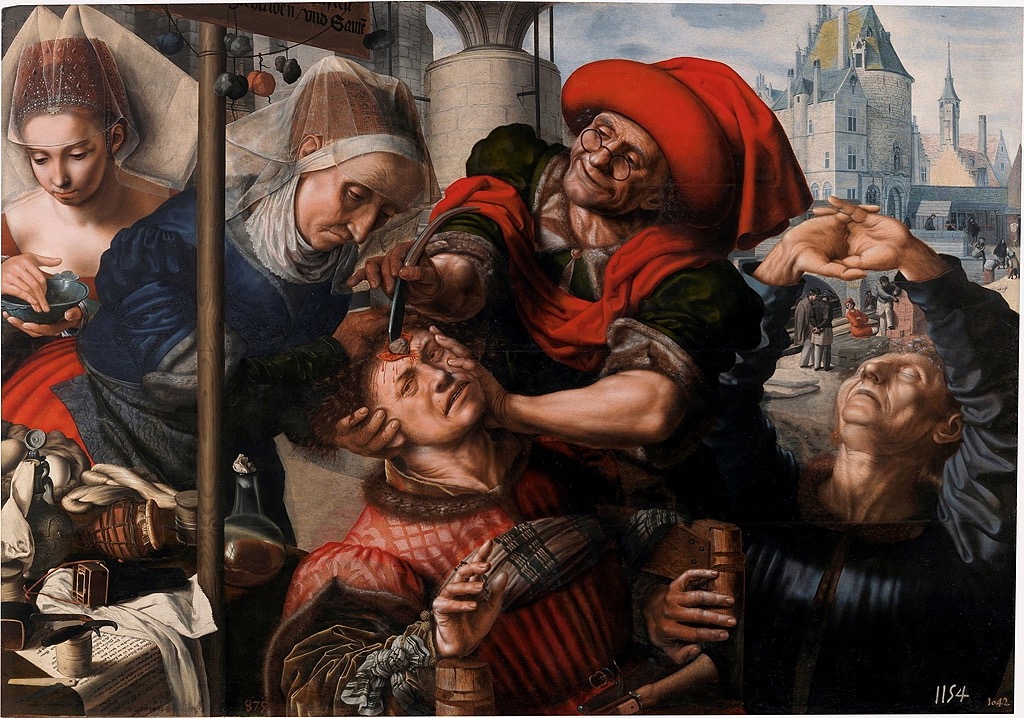
Jan Sanders van Hemessen: The Extraction of the Stone of Madness (c. 1550)
"I'm intrigued by any sales pitch which focuses upon all I will not get if I choose them for a relationship."
Those of us who create Homemade stuff, which I guess includes pretty much all of us, maintain relationships with our reliable suppliers, and we swear by the ones we adopt. My mom might have contended that "everything comes out of the same spigot before they put different labels on it," but I firmly believe (by which I mean I believe merely as a matter of conviction) that I use the absolutely best available brand of paint, for instance. I feel secretly shocked when I learn of someone favoring a different supplier, for I see that choice as clear evidence of their poor judgement. I might not attempt to convince them of their error, but only because I understand that nobody's likely to ever convince me that I have not discerned the very best paint supplier in the world, I have considerable treasure and effort invested in that choice. Others probably do in their's, too.
I've been visiting my paint store several times each week as we've worked through this Grand Refurbishing
OnMyKnees
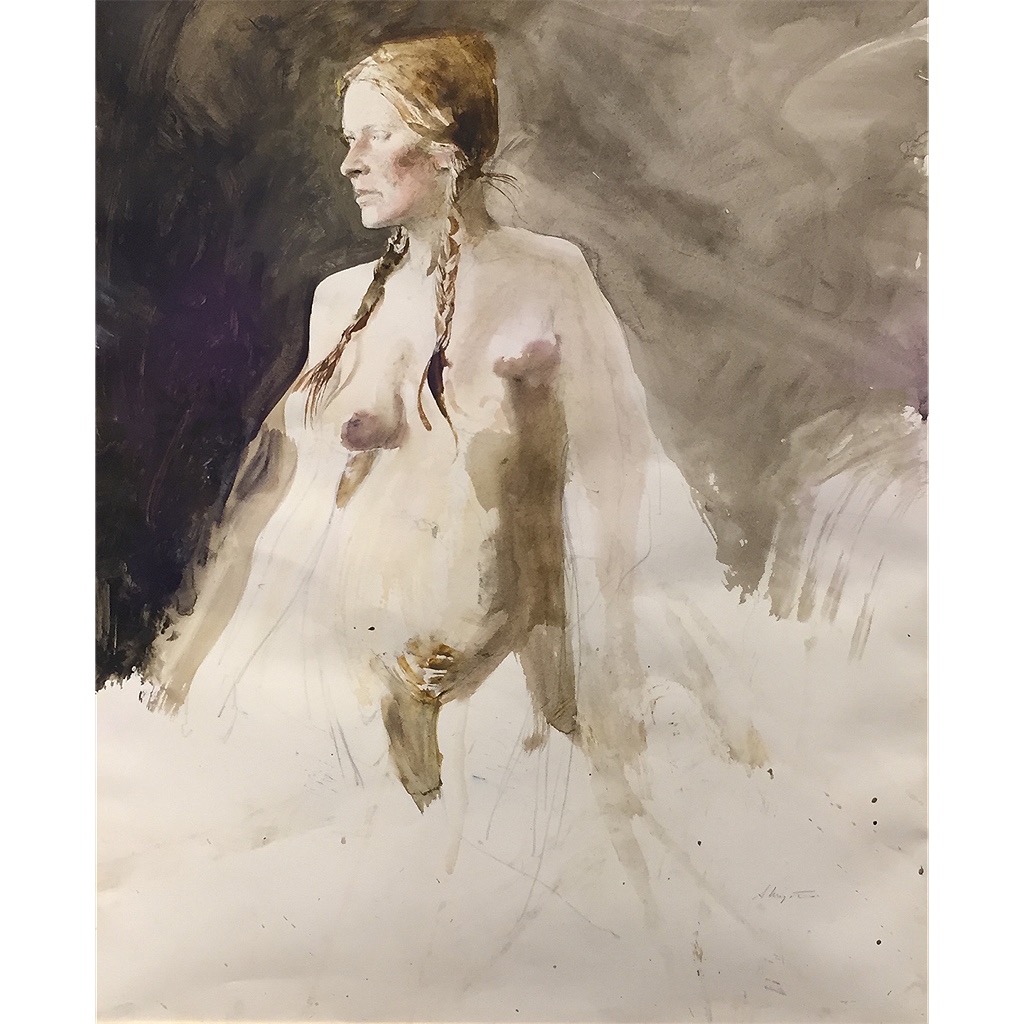
Andrew Wyeth: On Her Knees, Helga (1975)
"Self reliance has little to do with standing on one's two feet …"
Almost everything used to be Homemade. Now, only exceptions are. The transition, largely accomplished over the last century and a half, proved traumatic as well as transformative. Our GrandOther wants nothing to do with learning how to sew, for instance, once considered an essential skill. The Muse dedicates a whole room as her sewing room and even fabricated a tailor's dummy of her own body to enable her to design her own patterns and better fit her creations. Almost nobody does that anymore.
I spent yesterday afternoon on my knees sanding the margins of our grand staircase.
Crapsmanship
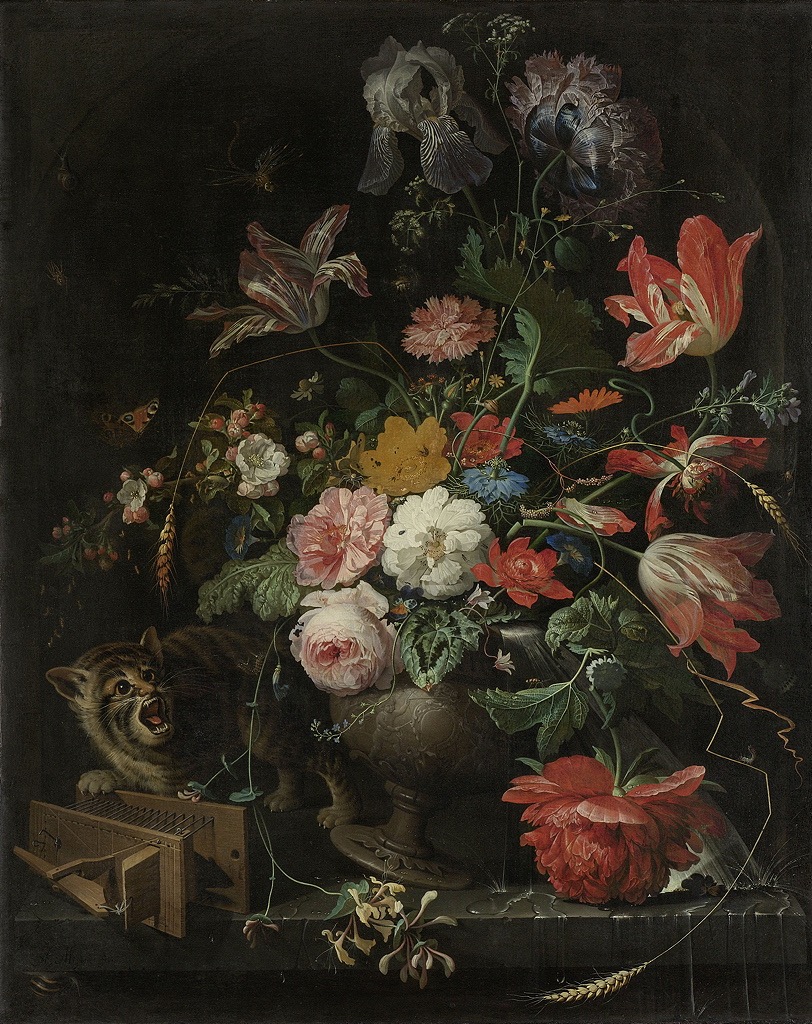
Abraham Mignon: The Overturned Bouquet (1660-79) -
This work is widely regarded as a truly terrible painting.
"That I can even discern the difference … suggests that I've already come far."
Removing master bedroom baseboards, I came upon one which almost defied removal. It was an odd section. While the other walls featured long single boards, this one was a short extension for a longer one. This wall's base had been broken into two sections. The Muse later noticed the outline of a prehistoric doorway just above this section, an entry into what we've imagined might have been a screened sleeping porch back before internal bathrooms were necessary. The board had been secured with four very large headed nails while the rest of the baseboard had been more properly anchored in with countersunk finishing nails. I had to destroy that board to remove it. It needed refabricating, anyway. I'd encountered a bit of shoddy workmanship again. Not my first encounter and probably not my last on this refurbishing effort. I thought back to an earlier story about our Colorado place which I titled Crapmanship and reminded myself that Crapsmanship is universal. Every house features some of it, regardless of how able a craftsman owned it then or now.
Not every fix measures up to the highest standards, and it probably makes sense that the shoddier work will need reattending to soonest.
Plumps
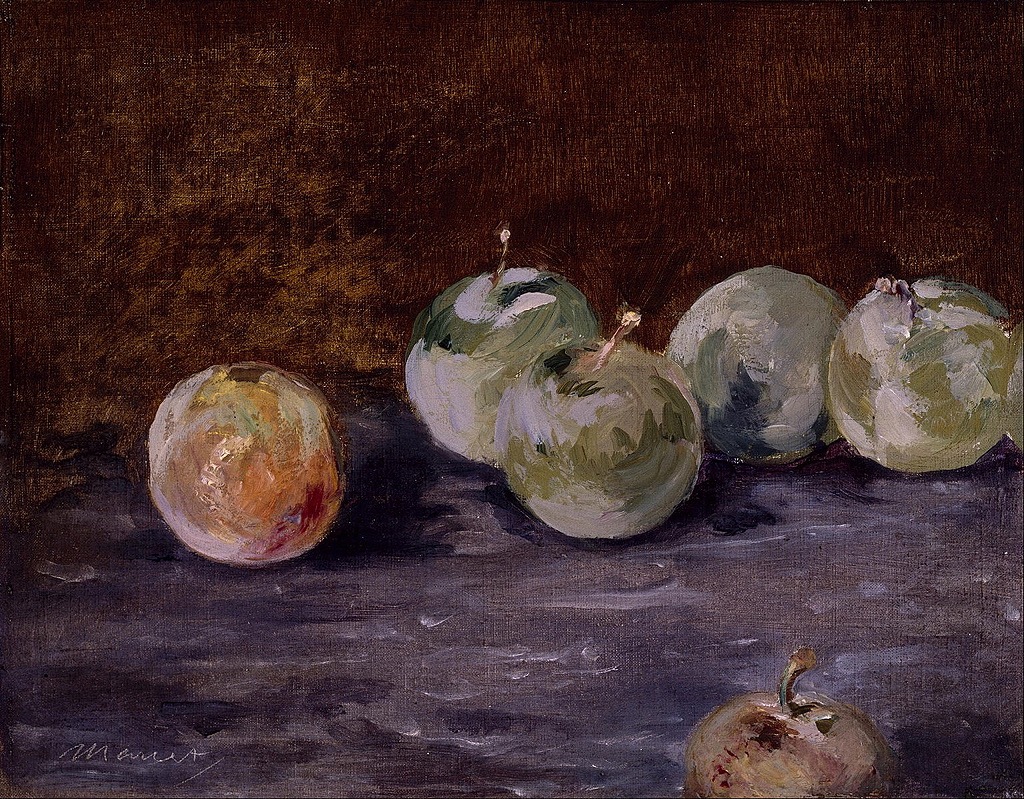
Edouard Manet: Plums (circa 1875-1885)
"[We] count ourselves wealthy and fortunate, and plump …"
When The Muse's son was small, he called plums "Plumps," in a typical childhood misunderstanding, a false cognate accomplished using only one language. My daughter referred to discussions as "disgustings" in a similar and similarly accurate misunderstanding. Plums are plump and might have been better named plumps from the outset. Of course, they are called plumps around The Villa and forever will be. Every home breeds its own dialect featuring words and interpretations unique to the people there, a Family Language. In the early Fall, The Muse's thoughts turn toward Plumps. She buys volumes of them fresh, even though most of the dried plumps from last year are still here with us, reposing in the basement larder.
The sole use for plumps in this house has been in dressing with which to stuff the Christmas goose.
Deceiving

Pere Borrell del Caso: Escaping Criticism (1874)
"I hardly ever catch myself Deceiving myself anymore …"
Deceiving might be the primary skill underlying every Homemade everything. Nobody starts off competent to make very much of anything at home or elsewhere, and considerable experience might well be required to get any better at making something fit. Criticism seems the very last thing any budding maker needs. Each rather needs the opposite of that. To accomplish this, Deceiving will be required, with self deception heading the list of those targeted with this gift, but it's wise to stay out of eyeshot of well-intended neighbors and the highly skilled, for they can never do any budding maker any good and often inadvertently inflict wounds grievous enough to convince anyone not to continue attempting. Competence requires considerable attempting, best done some distance from criticism.
One learns from their mistakes but not if they cannot escape them.
LastOne

Paul Gauguin: Vision after the Sermon (1888)
" … after gaining all the experience of fixing its eleven brothers."
The first one tends to be difficult for me to complete. I'm not even learning yet. I'm at best orienting myself, but I might be more accurately described as misleading myself, for I've gone off half cocked, without really understanding either the context or the possible solutions. I'm very likely a little frustrated and just attempting to dispatch this distraction, not yet having noticed a certain pattern to both this problem and to my default solution. The second one's usually much better. In terms of net improvement one over the other, the second probably represents the greatest improvement of the whole batch. Even if I do a dozen, no two will likely show as much improvement as the second from the first. The following ones will feature minor variations. That second one will likely prove to be a revelation representing the pattern for how I'll think that's done. I could still be wrong, but I'm feeling productive.
I know how to do very little and rely upon the stuff I fix to teach me how to fix them.
Homemade?
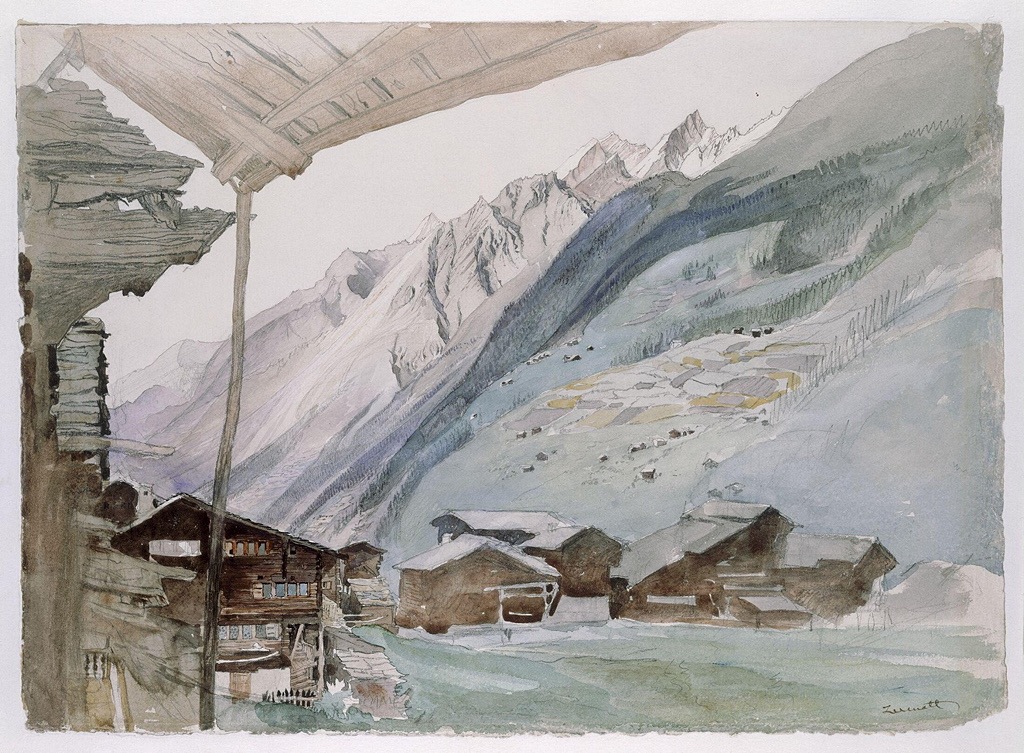
John Ruskin: Zermatt (1844)
"Done once, well enough, and never to be replicated."
By the end of each afternoon, my arms covered with a fine patina of sanding dust, I'm finished with my HomeMaking for the day and ready to make something for supper, something Homemade. As you already know if you've been following my stories, The Muse and I have been attempting to move into our home, The Villa Vatta Schmaltz, for six months, but have not yet managed to move completely in. We've been Refurbishing the place before setting deep roots, still living out of boxes and with dust, primitives as we attempt to elevate this house into our home again. There are no repeat performances. We once lived here, now we live here again. We are not back, but here, again for the very first time. This is our home now, though not yet fully finished. This is how Homemade works, wholes made out of somewhat unfinisheds.
Over the past three months, I wrote my daily stories under the heading of HomeMaking.


